From Tyneside to Hollywood

The exceptional talent of a Northumbria University graduate has been recognised around the world after he won both an Oscar and a BAFTA for his role as director of photography on the critically acclaimed film The Brutalist.
In March this year, Lol Crawley won the Oscar for Best Cinematography at the 97th Academy Awards, just days after he was awarded the British Academy Film award, or BAFTA, in the same category
While Lol now lives and works in Hollywood, his career journey began more than 5,000 miles away in Tyneside, when he arrived at Northumbria University to study Film in the 1990s. It was a decision that has shaped his professional journey, with the connections
he made and the skills he developed at university still influencing his work today. It was during his time at Northumbria that Lol developed his distinct style, teaming naturalistic lighting and exposure with a documentary feel, as well as an ethos of meaningful storytelling. As he explains: “I always wanted my work to reflect my personal values. To create something meaningful you need to have something to say, and some life experience. I found my
personal film-making style as a student at Northumbria, and I’ve stuck to it, creating a body of work with a continuity of aesthetic that makes sense when people look back at it.”
When it comes to inspiring young filmmakers with aspirations to work within the industry, Lol advises them to immerse themselves in all things film, both past and present, adding: “You have to want to be at the top of your craft. It’s not just about the practical skills but the
intellectual understanding, taking the time to really examine film theory. Success doesn’t happen overnight, it takes time, but the experience and confidence I gained during my time at Northumbria, as well as the connections within the industry, really helped me when I graduated and began carving out a career for myself.”
Lol is one of a growing number of Northumbria University graduates making a name for themselves in
the film industry. Another is producer Jack Tarling, whose first film God’s Own Country was nominated for Outstanding British Film at the 2018 BAFTAs, while his second Await Further Instructions was sold to streaming giant Netflix. Continues on page 2
SUMMER 2025
NEWS
Scientists discover oldest evidence of early human activity in Europe, Page 5
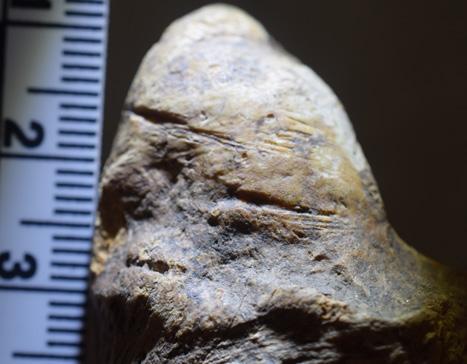
SUSTAINABILITY
Impact of volcanic activity on early marine life, Page 15

STUDENT EXPERIENCE
New brand of coffee culture takes hold in the North East, Page 16

HEALTH
Dementia Networks, technology set to transform dementia support, Page 21
SOCIETY
Basic Income pilot in Greater Manchester, Page 24
JUSTICE AND SECURITY
Support for doctoral students to explore the experiences of women who have been in prison, Page 25
ECONOMY



Using AI to cut construction waste and advance sustainability, Page 27

“THIS SUCCESS REFLECTS THE REMARKABLE CREATIVITY, ENERGY, AND DETERMINATION OF OUR STUDENTS AND DEMONSTRATES NORTHUMBRIA’S VITAL ROLE IN DRIVING AN INCLUSIVE REGIONAL ECONOMY.”
PROFESSOR GRAHAM WYNN
Top 10 for the 16th consecutive year
Northumbria University has been ranked a top university in the North East for graduate business start-ups based on estimated turnover, according to the latest Higher Education Business and Communities Interaction (HEBCIS) survey.
The University was the highest placed in the region and seventh in the UK measured by the estimated current employment rate of active graduate firms, meaning that Northumbria has now been in the top 10 nationally for graduate enterprises in each of the past 16 years under this metric. Northumbria was also ranked 18th in the UK for external investment raised, and 22nd nationally for active firms
surviving three years or more.
Commenting on the results, Professor Graham Wynn, Pro Vice-Chancellor (Education) at Northumbria, said: “This success reflects the remarkable creativity, energy, and determination of our students and demonstrates Northumbria’s vital role in driving an inclusive regional economy. In addition to launching innovative
enterprises and creating employment through our entrepreneurial graduates, Northumbria also places more graduates in highly skilled North East positions than any other university.”
Click the QR code to find out more about Northumbria’s ranking.

From Tyneside to Hollywood
Continued from Page 1
His third film Kneecap won the Audience Award at the 2024 Sundance Film Festival and was sold to Sony Pictures Classics. Last year fellow Northumbria graduate, cinematographer Si Bell was nominated for an Academy Award for his work on the short film The After, having also found success shooting Peaky Blinders and A Very British Scandal. And Sunderland-born Chris Foggin, who graduated from Northumbria in 2008, has also achieved success as director of films such as British comedy-drama Fisherman’s Friends, This is Christmas, and Bank of Dave. From September, Northumbria’s
BA (Hons) Film and TV Production degree programme will change to BA (Hons) Film, to reflect both demand from students and the skills required within the industry. It is a move that Dr Neil Percival, Co-Director of Cultural Partnerships at Northumbria, believes will result in continued success for graduates, as he explains:

“Professional practice, creativity and theory have always underpinned our programme, which has evolved continuously alongside the industry since its inception in the 1980s.

Our updated BA Film programme embodies the same principles that have launched many film and TV careers over the decades, and our partnerships with organisations such as the British Film Institute make sure that students are getting real-world experience, whatever their background. The big awards are exciting recognition of how far they can go, but of course we are proud of every single student who goes forward to carve out a niche in the sector.”
“PROFESSIONAL PRACTICE, CREATIVITY AND THEORY HAVE ALWAYS UNDERPINNED OUR PROGRAMME, WHICH HAS EVOLVED CONTINUOUSLY ALONGSIDE THE INDUSTRY SINCE ITS INCEPTION IN THE 1980S.”
The five universities that make up the Universities for North East England (UNEE) partnership have been awarded £8.9 million in Government funding for a new project that will drive growth and create jobs in the region.
The North East Strategic Commercialisation project, a five-year project involving Northumbria, Durham, Newcastle, Sunderland, and Teesside universities, along with other partners, aims to further support the region’s spin-out businesses and linkup collaborative research and development, licensing, and other forms of commercial activity with business partners.
The new project builds on the foundations of the Northern Accelerator spin-out programme — an existing collaboration between the five North East universities, along with York University, which has been providing multiple support elements to drive commercialisation of research and boost the region’s economy since 2016.
The new North East Strategic Commercialisation project will deliver in seven programmes addressing specific opportunities and barriers to expanding the commercialisation of university research across the region. The first of these will see additional resources, capacity, and leadership dedicated to support deeper collaboration between the partner Higher Education providers, and deliver enhanced and more structured engagement with an increased number of businesses.
Professor Andy Long, ViceChancellor and Chief Executive of Northumbria University, who represents UNEE on the North East Business and Innovation Board, said: “We are strongly committed to strengthening our economic and social impact through policy, advocacy and delivery activities.
“Creating intellectual property and delivering this into the economy through creation of new technology businesses or in partnership with corporate partners and regional SMEs is one of our priority areas of focus.
£8.9m backing for flagship partnership

Through this funding we will be able to increase our impact across the region.”
The announcement came days before a UNEE event in Westminster which brought together politicians, policy makers, business leaders, universities, and other partners to showcase the partnership and its potential to support the delivery of the Industrial Strategy and bring about growth and prosperity for the region and the UK as a whole. Speaking at the event, Chris McDonald, Labour MP for Stockton North, said that UNEE was an “incredibly important alliance” providing a single, unified voice for the region, and could be a blueprint for the rest of the UK.
region. It advocates for evidencebased policy development, investment, and widening access and participation in higher education.
Among those attending the House of Lords event, Kim McGuiness, Mayor of North East England, said she is very grateful that the region’s universities have come together as UNEE, and that the collective have “massive potential”.
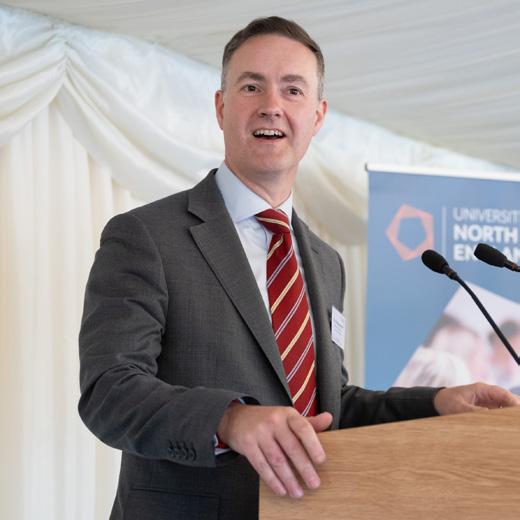
Also addressing the event was Baroness Elliott of Whitburn Bay, a Labour member of the House of Lords and former MP for Sunderland Central.
The collaborative partnership aims to strengthen the collective economic, social and cultural impact of higher education in the
Baroness Elliott reflected that UNEE’s work is of national significance, saying: “At a time when politics can feel fragmented and institutions stretched, UNEE offers a powerful example of working together for shared
“…OUR VISION FOR THE FUTURE IS TO WORK EVEN MORE COLLABORATIVELY THROUGH UNIVERSITIES FOR NORTH EAST ENGLAND, FORGING DEEPER CONNECTIONS WITH BUSINESSES AND LOCAL COMMUNITIES TO ADVANCE OPPORTUNITY FOR PEOPLE IN THE REGION”
PROFESSOR ANDY LONG
outcomes — not competing for prestige, but co-operating for progress.”
Commenting on the event
Professor Andy Long said: “It was a privilege to introduce Universities for North East England to partners old and new at Westminster, providing an opportunity to showcase the collective power, impact and ambition of the region’s five universities.
“As five independent institutions, we each bring unique strengths to the region.
Building on the foundations we’ve laid, our vision for the future is to work even more collaboratively through Universities for North East
England, forging deeper connections with businesses and local communities to advance opportunity for people in the region. This includes working together to enable more academic spin-outs and graduate start-ups to flourish, driving innovation, creating jobs and supporting economic growth in the North East and beyond.”
Click the QR code to find out more about UNEE and the North East Strategic Commercialisation project.

4 NEWS
Uncovering Arabia’s ‘green past’
Research led by Northumbria’s Dr Monika Markowska has revealed that one of the driest areas on Earth — the Saharo-Arabian Desert — enjoyed periods of humid weather and a greener landscape over the last eight million years.
While previous studies suggested that this arid landscape had been present for at least 11 million years, the new evidence challenges this belief, indicating that Arabia was much wetter during certain periods in history. And these wetter conditions would have enabled the movement of mammals and other species, which relied on water sources for survival.
The international team of researchers, which includes the lead author of the study Dr Monika Markowska, and Dr Ashley Martin from Northumbria University, has received support for their work from the Saudi Heritage Commission and the Saudi Ministry of Culture. The team made the discovery after using cave speleothems, more commonly known as mineral deposits, such as stalactites and stalagmites, to reconstruct a detailed climatic record. The record revealed multiple phases of humid weather in the central Arabian region, suggesting the climate was a lot wetter in the past than it is today. These humid intervals, which occurred over the course of eight million years, were characterised by higher rainfall, which supported a rich diversity of water-dependent fauna. The researchers believe these conditions were caused by tropical precipitation from the south reaching further north in the summer seasons.
University’s Department of Geography and Environmental Sciences, explained:
“Historically, the dry conditions of the Saharo-Arabian Desert have been proposed as a significant barrier to the dispersal of plants, animals, and early humans between Africa and Eurasia, but these findings shed new light on this hitherto unrecognised but important crossroad between Africa and Eurasia.
“Our findings highlighted that, as the monsoon’s influence weakened over time, precipitation during humid intervals decreased and became more variable. This coincided with enhanced polar ice cover over the Northern Hemisphere during the Pleistocene epoch.

Our research is one of the longest terrestrial records ever published.”

“HISTORICALLY, THE DRY CONDITIONS OF THE SAHARO-ARABIAN DESERT HAVE BEEN PROPOSED AS A SIGNIFICANT BARRIER TO THE DISPERSAL OF PLANTS, ANIMALS, AND EARLY HUMANS BETWEEN AFRICA AND EURASIA, BUT THESE FINDINGS SHED NEW LIGHT ON THIS HITHERTO UNRECOGNISED BUT IMPORTANT CROSSROAD BETWEEN AFRICA AND EURASIA.”
central place in mammalian and hominin migrations.”

Dr Monika Markowska, a Royal Society Senior Research Fellow in Northumbria
Faisal al-Jibrin, lead Saudi archaeologist of the Heritage Commission, said: “Arabia has traditionally been overlooked in Africa-Eurasia dispersals, but studies like ours increasingly reveal its
Professor Michael Petraglia, Director of Griffith University’s Australian Research Centre for Human Evolution and coauthor on the study, added: “These wetter conditions likely facilitated these mammalian dispersals between Africa and
Eurasia, with Arabia acting as a key crossroads for continentalscale biogeographic exchanges.”
Dr Markowska also leads a Royal Society University Research Fellowship exploring how dryland landscapes respond to a changing climate.
Find out more about research within the Department of Geography and Environmental Sciences by clicking the QR code.

Scientists discover oldest evidence of early human activity in Europe
A groundbreaking discovery in Romania has dramatically pushed back the date of early human ancestors’ arrival in Europe.
Dr Vasile Ersek, from Northumbria University’s Department of Geography and Environmental Sciences, was part of an international team of researchers to uncover clear evidence of early hominin presence in Europe at least 1.95 million years ago — nearly two hundred thousand years earlier than previously documented.
Hominins are closely related ancestors to humans, who migrated around the world from Africa. Until now, evidence suggested they had ventured into Europe 1.8 million years ago, but researchers have now been able to prove they were present in Europe around 200,000 years before then, after examining fossil bones found in Romania. Their findings have been published in scientific journal, Nature Communications.
Grăunceanu, an archaeological site in Romania, was originally excavated in the 1960s.
More than 5,000 bones from Grăunceanu and surrounding sites were meticulously examined. Although no hominin fossil bones were found, researchers did find evidence of cut marks in a selection of fossilised bones, made with stone tools used to remove the flesh from animals.
The team are confident at least 20 bones show signs of human butchery, evidencing the presence of early human ancestors in the area.
Dr Ersek, an expert in past climate changes and humanenvironment interactions, who co-wrote the paper, explained: “The cut marks appear in anatomical positions consistent with deliberate removal of meat

from the bones. Without the presence of human fossils from the site, we cannot determine which species of early human made these marks. It is possible they could have been made by Homo erectus, or even earlier members of our genus.”
The research team used uranium-lead dating to determine the age of the fossils, providing an average estimated age of 1.95 million years, with some bones as old as 2.01 million years. This makes Grăunceanu the oldest well-dated site in Europe with evidence of human activity. Prior to this discovery, the site of Dmanisi in Georgia was thought to contain the oldest evidence of hominin activity outside of Africa, dated to roughly 1.77 to 1.85 million years ago.
Using fossilised horse teeth also found at the site, Dr Ersek was able to reconstruct the climate during this period in Northumbria University’s Stable Isotope Laboratory. He explained: “The isotope analysis showed that while winters were mild enough to support warm-adapted animals like pangolins and monkeys, the climate was markedly more seasonal than in Africa. This demonstrates that these early humans had adapted to live in a climate with distinct wet winters and dry summers.
“The combination of clear evidence for butchery activities and detailed climate reconstruction provides some fascinating insight into the lives of these ancient pioneers.” Analysis led by other members of the international
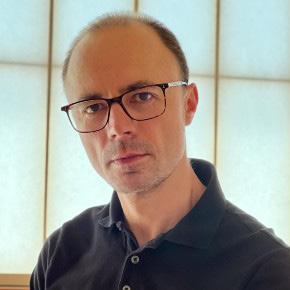
“THE COMBINATION OF CLEAR EVIDENCE FOR BUTCHERY ACTIVITIES AND DETAILED CLIMATE RECONSTRUCTION PROVIDES SOME FASCINATING INSIGHT INTO THE LIVES OF THESE ANCIENT PIONEERS.”
research team, which included academics from Ohio University, the University of Arkansas and the Emil Racoviţă Institute of Speleology in Bucharest, also showed the presence of woolly rhinos, sabre-tooth cats and mammoths.
Northumbria was ranked second in the UK for research power in Geography and Environmental Studies, with over 90 per cent of research
outputs rated as world-leading or internationally excellent in the 2021 Research Excellence Framework.
Click the QR code to discover more about the paper, Hominin presence in Eurasia by at least 1.95 million years ago.

Royal Astronomical Society honour for space physicist
Dr John Coxon, an esteemed member of Northumbria University’s worldleading Solar and Space Physics research group, has been recognised by the Royal Astronomical Society for his work.
Dr Coxon is a Science and Technology Facilities Council (STFC) Ernest Rutherford Fellow at Northumbria University who has garnered international recognition for his research into understanding the Sun’s influence on Earth’s space environment. Earlier this year he was awarded the prestigious 2025 Fowler Award from the Royal Astronomical Society, reflecting his significant contributions to the field of solar and space physics.
Dr Coxon is a specialist in the electric currents known as Birkeland currents which flow between the boundaries of the Earth’s magnetic field and its atmosphere. These currents play a key role in space weather effects on Earth, by channelling solar wind energy to the ground, where the impacts can be felt on ground-based infrastructure. This can result in power grids being overloaded, disrupting communications and navigation systems.
Each year the Royal Astronomical Society recognises significant achievement in the fields of astronomy and geophysics through awards, medals, and prizes, acknowledging talent across research, education and outreach. The Royal Astronomical Society Fowler Awards are presented annually to individuals who have made noteworthy contributions to

“ALL OUR AWARD WINNERS ARE AN INSPIRATION AND IT IS CLEAR TO ME THAT THE DEPTH OF TALENT MEANS THAT THE FUTURE OF OUR SCIENCES IS INCREDIBLY BRIGHT.” astronomy or geophysics.
Speaking about his award, Dr Coxon said: “I’m enormously honoured to have been given the Fowler Award. I have thoroughly enjoyed being a part of the Magnetosphere, Ionosphere and SolarTerrestrial, or MIST, community over my career and I’d like to say thank you to everyone I’ve worked with and who nominated me.”
Professor Mike Lockwood, president of the Royal Astronomical Society said:
“Awards are a very important part of the Society’s function: the senior awards recognise a lifetime in science and great
discoveries and the junior awards help build careers.
“It gives me great pleasure to see so many talented individuals being rewarded for their hard work, dedication and immense contributions to the fields of astronomy and geophysics. “All our award winners are an inspiration, and it is clear to me that the depth of talent means that the future of our sciences is incredibly bright.”
Dr Coxon is part of a distinguished group of researchers at Northumbria University, including multiple fellows and award recipients, who are advancing
MIKE LOCKWOOD,
the frontiers of solar and space physics. Northumbria collaborates extensively with partners including UK Research and Innovation, the UK Space Agency, the UK Met Office, and over 40 other industrial partners on cutting edge solar and space physics research, as well as a multitude of other specialist areas, from satellite communications and
space physiology to earth observation and space law and policy.
Click the QR code to find out more about Dr Coxon’s work and the Solar and Space Physics research group at Northumbria.

Neptune’s auroras captured on camera for the first time
Scientists from Northumbria University are part of a team of researchers who have captured the first images of bright auroral activity on Neptune, using NASA’s James Webb Space Telescope.
Auroras — a natural light display in the sky — occur when energetic particles, often originating from the Sun, become trapped in a planet’s magnetic field and eventually strike its upper atmosphere, with the energy released during these collisions creating the aurora’s signature glow. In the past, astronomers have seen tantalizing hints of auroral activity on Neptune but have not been able to capture images of it. Despite successful detections on Jupiter, Saturn, and Uranus — Neptune was the missing piece of the puzzle when it came to capturing auroras on the giant planets of our solar system.
However, after being given access to NASA’s James Webb Space Telescope, an international team of researchers have been able to not only finally capture images of Neptune’s aurora but also make a surprising discovery about the weather conditions on the planet.
The Webb telescope uses infrared radiation to look deep into space, meaning it can observe the first stars and even the formation of the first galaxies. Using data from Webb, researchers discovered a surprising change in Neptune’s temperature over the last 30 years, which also helps account for the difficulty in spotting the aurora until now. Their findings have been published in the journal Nature Astronomy
Lead author Dr Henrik Melin, Northumbria University, explains: “It turns out, actually imaging the auroral activity on Neptune was only possible with Webb’s near-infrared sensitivity. It was so stunning to not just finally
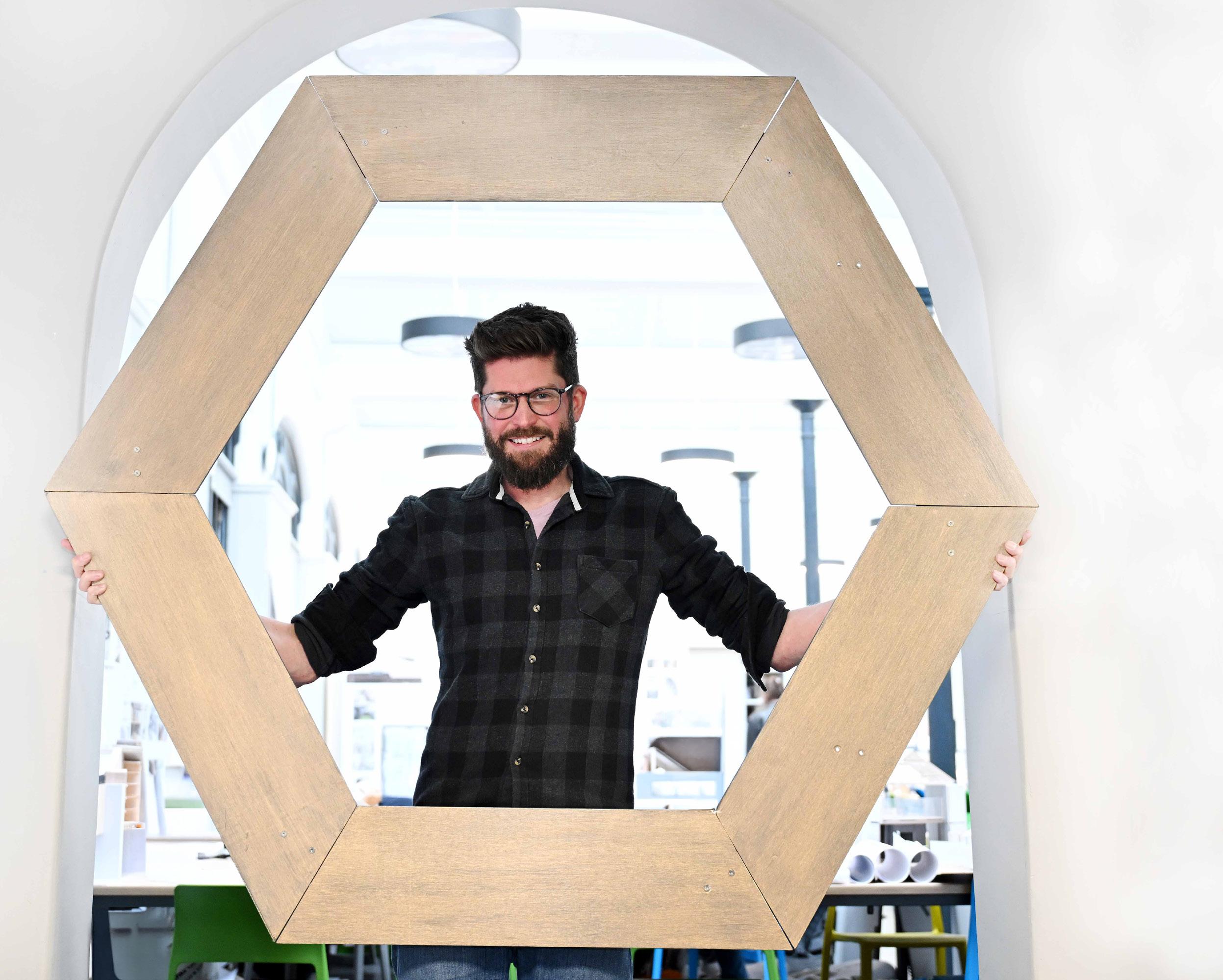
“IT TURNS OUT, ACTUALLY IMAGING THE AURORAL ACTIVITY ON NEPTUNE WAS ONLY POSSIBLE WITH WEBB’S NEAR-INFRARED SENSITIVITY.”
see the auroras, but also the detail and clarity of the signature, which really shocked me.”
The research team analysed data obtained in June 2023, using Webb’s Near-Infrared Spectrograph. In addition to capturing images of the planet, they were also able to measure the temperature of the planet’s upper atmosphere, known as the ionosphere. Their observations revealed a significant drop in temperature since it was last measured during a flyby of NASA’s Voyager 2 spacecraft in 1989. Dr Melin said: “I was astonished — Neptune’s upper atmosphere has cooled by several hundreds of degrees. In fact, the temperature in 2023 was just
over half of that in 1989.”
Through the years, astronomers have predicted the intensity of Neptune’s auroras based on the temperature recorded by Voyager 2, but a substantially colder temperature would result in much fainter auroras. It is likely that this cold temperature is the reason that Neptune’s auroras have remained undetected for so long. The dramatic cooling also suggests that this region of the atmosphere can change greatly even though the planet sits over 30 times farther from the Sun compared to Earth.
Neptune’s auroras are located at the planet’s geographic midlatitudes around where South America is located on Earth.
DR
PICTURED WITH A LIFE-SIZED REPLICA OF ONE OF THE WEBB TELESCOPE’S 18 INDIVIDUAL HEXAGONAL MIRRORED PANELS
Below:
Neptune’s auroras as captured by the Hubble Space Telescope and James Webb Space Telescope

An

This is due to the strange nature of Neptune’s magnetic field, which is tilted by 47 degrees from the planet’s rotation axis. Since auroral activity is based where the magnetic fields converge into the planet’s atmosphere, Neptune’s auroras are far from its rotational poles.
The ground-breaking detection of Neptune’s auroras will help us understand how Neptune’s magnetic field interacts with particles that stream out from the Sun to the distant reaches of our solar system, a totally new window in ice giant atmospheric science.
Equipped with these new findings, astronomers now hope to use the Webb telescope to study Neptune over a full solar cycle, an 11-year period of activity driven by the Sun’s magnetic field. Results could provide insights into the origin of Neptune’s bizarre magnetic field and even explain why the planet is so tilted.
Click the QR code to find out more about solar and space physics research at Northumbria University.

Award for academic with stellar vision
Professor John Woodward, Pro Vice-Chancellor (International) at Northumbria University was named Education Champion at the Northern Leaders Awards earlier this year for his work to develop the University’s new North East Space Skills and Technology Centre (NESST).

Working with local and national government; regional, national and international industry leaders, and colleagues across the University, Professor Woodward has driven the development of the Centre which will be instrumental in positioning the North East as a hub for space research and education.
The inaugural BusinessCloud Northern Leaders Awards honoured individuals who have made — and continue to make — the biggest positive difference to the North. A total of 19 winners across 15 categories were celebrated at the event, with Professor Woodward being awarded the Education Champion title.
Reflecting on the award, Professor Woodward said: “NESST is the perfect example of how Northumbria’s research excellence is enriching our taught programmes and supporting skills development. The centre will allow us to foster a talent pipeline for the rapidly growing North East space sector.
“NESST is a huge collaborative effort which will play an essential role in launching the UK as a space superpower, and I am delighted to accept the award on behalf of everyone involved in NESST.”
As well as putting the UK and the North East at the forefront of space research and innovation, NESST will also provide the specialist education and training required to ensure the UK space sector has the highly skilled workers it needs in the future. From undergraduate and postgraduate degree programmes to Continuing Professional Development courses and T-Levels, NESST will enable Northumbria to support more students to access training and education in the space industry.
Click to find out more about NESST and how Northumbria is powering the next generation of space innovation.

Lecture series helps celebrate 200 years of iconic Lit & Phil
Researchers from Northumbria University are helping to celebrate the bicentenary of an iconic Newcastle building which has been the backdrop for groundbreaking scientific displays and discussions, including Sir Joseph Swan’s historic 1880 demonstration of the incandescent light bulb.

In July 2025, the Newcastle Literary and Philosophical Society celebrates 200 years since the opening of its historic home on Westgate Road. Known locally as the Lit & Phil, the library has become a cornerstone of Newcastle’s cultural and creative heritage. To celebrate this milestone, it will host Inspired By, a free public lecture series that brings to life historical discussions for a contemporary audience. Revisiting past topics such as the Arctic regions, astronomical discoveries, and the planets, experts from Northumbria University will offer new insights, linking these enduring themes to modern day research.
Organised by Martyn Amos, Professor of Computational Science at Northumbria University’s Department of Computer and Information Sciences, the Inspired By series is the latest in a programme of public talks involving Northumbria
University speakers at the Lit & Phil. “It’s fantastic that we’ve been able to curate open and accessible lectures to provide a link between past and present and bring the latest knowledge to audiences on areas of research that have always fascinated the public,” Professor Amos explained.
The Inspired By series began earlier
this year with a talk by polar scientist Dr Sammie Buzzard, who explored the advances in polar research over the past two centuries. She said: “It was a privilege to be part of this series, celebrating such an important institution and reflecting on how far polar science has come.”
Kay Easson, Head Librarian at the Lit & Phil, added: “Although the texts of most of the original lectures haven’t survived, we do have the original titles, so it’s exciting to see them reimagined by everyone involved at Northumbria University and brought to life for audiences today.”
Click the QR code to discover the range of lectures in the Inspired By series which runs throughout 2025.

A decade of dedication

“TANNI’S EXTRAORDINARY CONTRIBUTIONS WILL HAVE A LASTING AND POSITIVE INFLUENCE ON OUR UNIVERSITY COMMUNITY.”
PROFESSOR ANDY LONG
It was 10 years ago, in the ornate and rather ethereal nave of Newcastle Cathedral that Baroness Tanni Grey-Thompson was inaugurated as Northumbria University’s Chancellor and awarded an honorary Doctor of Civil Law. As Tanni reaches the end of her tenure, Northumbria University News looks back on Tanni’s inspirational journey and her unwavering commitment to championing equality, social mobility and education.
Appointed as the University’s fourth Chancellor in 2015, Tanni brought an extraordinary legacy as one of Britain’s most decorated Paralympians, and a powerful voice in public life. Born with spina bifida, she went on to compete in five Paralympic Games and won 11 gold medals, while also triumphing six times in the London Wheelchair Marathon. Her sporting excellence saw her receive a Damehood for services to sport and later, in 2019, the BBC’s Sports Personality of the Year Lifetime Achievement award.
Speaking at the time of her appointment Tanni said: “In my career I have tried to inspire young people to be the best that they can be, to take chances and to bring about positive change in society, so the chance to become closely
involved in a major university is a wonderful opportunity to continue that work.” Her aspiration went on to define her time at Northumbria as she set out to inspire and encourage an entire university community. Reflecting on the choice to appoint Tanni as Chancellor Chris Sayers, Northumbria’s former Chair of the Board of Governors, said “Tanni fit so perfectly into the role as Chancellor because she stood for everything that the university would become — world-class and never accepting second best. Her passion for education, deep commitment to fairness, and to ensuring opportunity for
everybody embodied everything that Northumbria stands for.”

Over the next ten years, Tanni would go on to use her experience of performing on the world’s biggest sporting stage to support Northumbria’s student athletes, often offering advice and encouragement to aspiring Olympians and Paralympians. She also used her experience to support various areas of research at the University – speaking on inequalities and inadequacies in women’s sport, making recommendations for improving diversity in Sports Journalism and taking a genuine interest
in the extensive research and activity around food poverty and insecurity.
Professor Andrew Wathey, who was Vice-Chancellor and Chief Executive of Northumbria University at the time of Tanni’s appointment, praised her impact: “Tanni is an inspiration to millions around the world, and it was an honour to work alongside her through some of the University’s most transformative years.
“Her achievements in sport and as a champion for diversity, youth and wellbeing, have truly enriched the life of the University, and she has been an inspiration for our students, graduates and staff across the world.”
Over the years Tanni has had the opportunity to shake thousands of Northumbria students’ hands as she
presided over the University’s graduation ceremonies. “Tanni has become a familiar and warmly welcomed presence at graduation ceremonies, where she has personally congratulated thousands of students, reflecting her genuine interest in the lives and futures of Northumbria’s graduates.” said Professor Andy Long, ViceChancellor and Chief Executive.
Beyond her presence on campus, Tanni’s advocacy extends far beyond the University and into national policy and public life. As an Independent Crossbench Peer in the House of Lords, she draws upon her lived experience to influence national policy, speaking passionately on issues ranging from disability rights and welfare reform to youth development and sport, consistently championing education in national debate.
Dr Roberta Blackman-Woods, Northumbria’s Chair of the Board of Governors said: “It has been a real pleasure to work with Tanni over the past five years in her role as Chancellor of Northumbria. Her journey and her achievements are wondrously inspiring for our students as is her life of public service as a committed parliamentarian who champions causes she truly believes in.
“I want to thank her for everything she has done as Chancellor to promote the values, achievements and aspirations of Northumbria University.”
As she steps down in summer 2025, Tanni leaves an enduring legacy of a Chancellor who embodies resilience, integrity, and aspiration.
Professor Andy Long, ViceChancellor of Northumbria university, said: “Tanni’s extraordinary contributions will have a lasting and positive influence on our university community. She has been a passionate advocate for our students and staff and has shown unwavering commitment in her support for Northumbria.
“On behalf of the entire University community, I want to express our heartfelt thanks. We are truly grateful for her dedication, and the lasting impact she has made during her remarkable tenure as Chancellor.”
THE BIG INTERVIEW
A Paralympic legend, crossbench peer in the House of Lords, and tireless advocate for equality, inclusivity, and education, Tanni has been a powerful ambassador for Northumbria University. In this exclusive interview, Tanni reflects on her time in the role, shares her proudest moments, and offers her hopes for the University’s future.
When I was asked to be Chancellor, I met with Professor Andrew Wathey and Chris Sayers — the University’s then ViceChancellor and the Chair of the Board of Governors, respectively. We had a great discussion, but they then encouraged me to get out on campus and speak to people by myself, confident that if I really wanted to understand what Northumbria was all about, I would get a straight answer from its students. Some might have thought that was a big gamble by Andrew and Chris! I spent time wandering around campus, chatting to students, and asking about the University, the community, and
their plans for the future. They spoke so positively about their experience and were genuinely so enthusiastic about how being a Northumbria student put them in the best possible position for whatever they wanted to go on to do next. This struck a chord with me on a personal level because I always remember my father saying that education is important because it would give me choices, choices that would help shape my future. Listening to Northumbria’s students, I knew instantly that I wanted to be part of this university and everything it does to raise aspirations and provide choices and opportunities for its students.
Absolutely. I think universities have a huge role to play, not just in education, but in helping to shape the world around them, and that’s something Northumbria does incredibly well. We know that Northumbria places more graduates into highly skilled jobs in the North East than any other university. That’s a massive contribution to individual lives, local businesses, and the economy. But it’s about more than just jobs. It’s about helping students to broaden their horizons, believe in themselves, and imagine futures they might not have thought possible. For many, I believe Northumbria is where they begin to realise what they are really capable of.
But I think the regional
impact is huge too. There’s long been that old cliché — “It’s grim up North” but Northumbria has done, and is doing, a huge amount to challenge and change that perception. Whether it’s through research, cultural initiatives, or work that drives social change, the University is key to so many positive developments in the region.
Our Northumbria manifesto talks about us constantly “reinventing and reshaping to make the impossible possible.”
Just look at what we are doing in the space sector — building the North East Space and Skills Technology Centre (NESST) right here on our campus that will bring together industry and academia to transform the UK space economy. That doesn’t look grim to me!
BARONESS TANNI GREY-THOMPSON

It’s changed a lot – and in really exciting ways. Northumbria is much more visible now. It’s vibrant, it’s confident, and its profile has grown massively. People now know where and who Northumbria is, and they know what we stand for. When I visited Northumbria for the first time in 2015, two things stood out to me. The first was the people – who are extraordinary. And the second was the level of ambition: it was never about being a bit better, it was about being the absolute best — something that really

chimes with me! That really is apparent when I think about the sustained run of national recognition for the University across the last ten years. In 2022, we won University of the Year in the Times Higher Education Awards in 2022 — often referred to as the Oscars of Higher Education! And most recently, we were named Modern University of the Year 2025 by The Times and The Sunday Times. These titles confirm everything I know about this fantastic institution, its remarkable staff, and phenomenal students. Of course, one of the most significant changes I’ve seen over the last decade has been
Northumbria’s transformation in research, which saw us record the biggest rise in research power for the second time in the Research Excellence Framework in 2021. Northumbria is a genuine research-intensive university, and more importantly, its research is making a real difference. Whether it’s space research, improving health outcomes, or driving innovation in technology, you can literally see the impact it’s having. For me, it’s been a real privilege to witness this incredible, exciting journey — to see the University grow from strength to strength. I’ve watched it with a huge sense of pride, and I’ll always feel immensely honoured to be part of something so extraordinary.

What have you enjoyed most about being Northumbria’s Chancellor?
Having the chance to greet Northumbria students at their graduation ceremonies was the role I was looking forward to when I took up the position of Chancellor, and it is definitely the thing I have enjoyed the most. It’s such a privilege to be able to congratulate each student as they cross the stage, and to personally acknowledge and celebrate their achievements. I’ve had everything from fistbumps to hugs and selfies — it’s impossible not to smile at every interaction.
But it’s the overwhelming joy of the day, and seeing students celebrate with their friends and families that is priceless. I’ll cherish so many heartwarming (and funny!) stories from congregations. I always tell graduating students to enjoy their special day and create memories that will make them smile for years to come — but in truth, they have, without doubt, helped create memories that will make me smile long after my tenure as Chancellor ends.
What are your hopes for Northumbria going forward?
My biggest hope is that Northumbria continues to do what it does best: evolve, react, and adapt to meet the needs of both its students and the world around it. The world is changing at an exhilarating pace. Who knows what students will need in ten years’ time? But if there’s one thing I am confident about, it’s that Northumbria will be ready. Northumbria isn’t held back by tradition or age. It fully embraces being a modern
university and uses that as a strength. It recognises how society is shifting, how the idea of what a “typical” student looks like is evolving, and responds to that by listening, innovating, and leading. So, I hope it keeps doing that — keeps challenging the norm, pushing boundaries, and being bold. There are some incredibly exciting things on the horizon for Northumbria and I’m really looking forward to seeing where it goes next
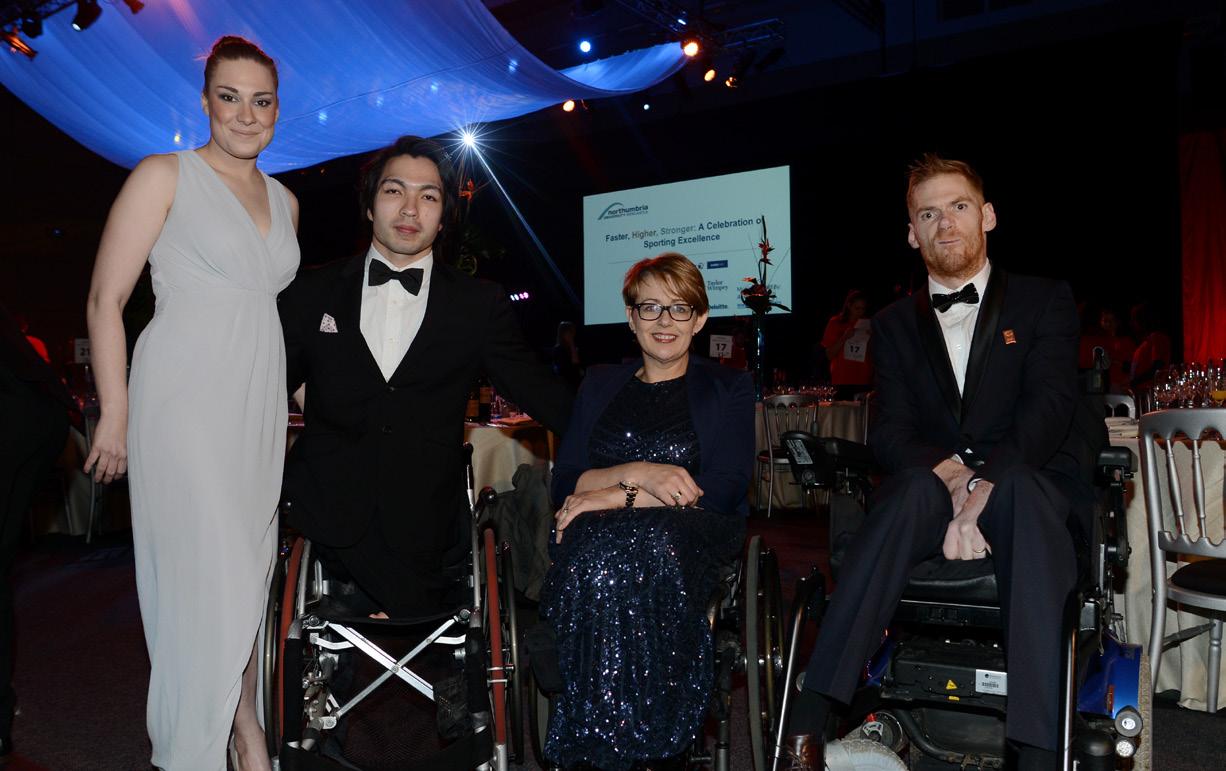
What message would you like to leave for students?
I tell students at graduation that wherever they go in the world and whatever they go on to do, to carry their degree from Northumbria University with pride. I truly believe that students leave Northumbria with a solid foundation on which to build their tomorrow. I often reflect on the fact that some of the world’s bestknown companies and brands are powered by Northumbria alumni who, working for a range of organisations and companies, across different sectors, are united in the way
“ IN A WAY, I FEEL AS THOUGH I’M GRADUATING MYSELF — IT’S BITTERSWEET. I’M GOING TO MISS THE UNIVERSITY, BUT AFTER AN ENTIRE DECADE OF CONNECTING WITH NORTHUMBRIA’S STAFF, ITS STUDENTS, AND THEIR FAMILIES AND FRIENDS, I KNOW THAT THE RELATIONSHIP I HAVE BUILT IS EVERLASTING. THAT SPECIAL CONNECTION WILL ALWAYS BE THERE, AND I WILL ALWAYS BE AN AMBASSADOR FOR NORTHUMBRIA — A UNIVERSITY I GENUINELY BELIEVE IS TRULY SPECIAL.”
What’s next for you?
My parliamentary work keeps me extremely busy, and I continue to be involved in several All-Party Parliamentary Groups debating on welfare reform, accessibility and equality, and sport. I’m passionate about campaigning for disability rights so that work will continue, and I’ll of course continue to champion education in whatever I do. I remain a huge advocate for education, and I strongly believe that it should be accessible to everyone, irrespective of their background or situation.
they are making an impact and transforming both their lives and the lives of others. So, the message I would want to give them is to have confidence — they are brilliantly equipped to go out there and embrace the opportunities that lie ahead. I’d also say don’t forget Northumbria — stay in touch and come back to share your experiences and create opportunities for future students as so many of our amazing alumni have done over the years.
I’ve been fortunate enough to work alongside some of Northumbria’s inspirational academics on some vital areas of research, such as inequalities in women’s sport and child food poverty and insecurity, so I’m looking forward to continuing to support that where I can. In a way, I feel as though I’m graduating myself — it’s bittersweet. I’m going to miss the University, but after an entire decade of connecting with Northumbria’s staff, its students, and their families and friends, I know that the relationship I have built is everlasting. That special connection will always be there, and I will always be an ambassador for Northumbria — a university I genuinely believe is truly special.
The Conversation is a collaboration between news editors and academics to provide informed news analysis and commentary that’s free to read and republish. At Northumbria, our academics have been working with The Conversation to produce independent, quality current affairs journalism on some of the latest topics to hit the news.
If you have a great idea for an article, please email media.communications@northumbria.ac.uk

BROWN RICE CONTAINS MORE ARSENIC THAN WHITE RICE –BUT HERE’S WHY YOU SHOULDN’T WORRY
Brown rice contains more arsenic than white rice, according to a recent study from the US. Understandably, that might sound alarming, as after all, arsenic is a well-known toxin. But the levels found in brown rice are not a health risk and brown rice, like other whole grains, is still an important part of a healthy diet.
To understand the issue, it helps to remember an old principle from toxicology: the dose makes the poison. In other words, harmful substances can be harmless — or even beneficial — at low enough doses. Arsenic, while dangerous in high amounts, is naturally found in soil and water and can show up in many foods, including rice.


Continue reading the full article at The Conversation.



Continue reading the full article at The Conversation.
FREE FOOD AND BEER ARE COMMON PERKS FOR HOSPITALITY WORKERS –BUT ARE THEY MASKING UNFAIRNESS?
For cafe and restaurant workers, getting a free drink or meal at the end of a long shift might feel like a well-deserved reward. But could such perks – common across the industry – be masking deeper issues?
Informal workplace perks have long been a big part of Australian hospitality culture. It’s common for restaurants and cafes to provide a free on-shift meal or heavily discounted menu items for their employees. In some bars and pubs, an end-of-shift alcoholic drink is a well-appreciated tradition. Less well understood is the question of how these widespread perks are interacting with workers’ legal rights.
Find out more about The Conversation, and keep up to date with articles by Northumbria academics, by visiting www.theconversation.com or our online newsroom at www.northumbria.ac.uk/news
Graduate AI business goes global

“I’M SO PROUD OF EVERYTHING I HAVE ACHIEVED SO FAR WITH AYOOB AI, AND THE ADVICE AND GUIDANCE FROM THE TEAM AT NORTHUMBRIA’S INCUBATOR HUB CANNOT GO UNNOTICED.”
Northumbria University graduate, Husain Ayoob, has achieved global entrepreneur status after his Newcastle-based AI business skyrocketed within the first twelve months of launching. Supported by Northumbria’s student and graduate enterprise team, Ayoob AI is now operating worldwide with clients in Paris, Dubai, and Singapore, to name a few.
Originally from Bahrain, Husain Ayoob graduated from Northumbria in 2024 with a degree in Computer Science with Artificial Intelligence. During his final year at university, Husain took part in a six-month live project with Lockheed Martin alongside two of his classmates from Northumbria’s Cybersecurity and Computer Science undergraduate programmes. Using advanced software, they scanned computer networks for security weaknesses. The group of students designed a piece of software using AI to detect cyberattacks and, through the use of Chat GPT, created a professional report similar to those used in realworld cybersecurity testing. This hands-on experience as a consultant, combined with tackling a live industry brief, gave Husain the confidence to launch Ayoob AI with support from Northumbria’s student
and graduate enterprise team and Incubator Hub — a purpose-built facility offering cutting-edge technology and business guidance for entrepreneurs.
Ayoob AI is a unique AI-based company that builds fully tailored, full-code solutions, empowering businesses to operate with enhanced precision and efficiency, putting them at a competitive advantage in their markets. And with an impressive list of partners, including the Department for Business and Trade, Ayoob AI delivers personalised AI solutions to major organisations across the world, including one of Dubai’s
largest catering companies and a leading UK financial investment firm.

“I’m so proud of everything I have achieved so far with Ayoob AI, and the advice and guidance from the team at Northumbria’s Incubator Hub cannot go unnoticed,” Husain said. “They gave me the roadmap I needed to follow from a professional, governmental, and personal standpoint, showing me how to juggle daily life whilst building a global company from the bottom up. They helped me see the potential of Ayoob AI and believed
in me to grow it at scale. It is an incredibly exciting time for us, and I look forward to continuing to work with major brands and organisations around the world.”
Graham Baty, Head of Enterprise Development at Northumbria, said: “Husain immediately impressed us with his knowledge and expertise in AI, and the plans he had to utilise that to not only start a business, but to create something at scale. In less than 12 months, the development, both for Husain personally, and that of the business, is fantastic to see, and a testimony to Husain’s vision.”
In December, Ayoob AI was one of a handful of businesses selected to pitch their digital business services to luxury brand group, Louis Vuitton Moët Hennessy (LVMH). The programme enabled Husain to showcase his innovative solutions company
to senior leaders from global manufacturers and to open up doors to potential collaboration opportunities. Husain also recently attended the Universities UK Chancellors Reception hosted by Lord David Willetts at the House of Lords. The event focused on the impact universities are having on entrepreneurship and economic growth. Husain was invited to demonstrated this impact and discuss how technology and AI are shaping the future of business, with education, government, and business leaders.
Click the QR code to learn more about the business support available for students and graduates at Northumbria.

Inspiring the next generation of scientists
Northumbria University and the International Centre for Life (Life) have agreed a new strategic partnership to boost science education and engagement across the North East.
The new agreement builds on 15 years of collaboration between the two organisations which has helped bridge the gap between academia and the community, engaging people across the region with science, technology, engineering and maths (STEM).
Life celebrated its milestone 25th birthday in May and this agreement reinforces its wideranging programme to engage people from all backgrounds in STEM underpinned with Northumbria University’s world-leading research and academic expertise. Under the new agreement, signed by Northumbria University’s ViceChancellor and Chief Executive, Professor Andy Long and Life Chief Executive Linda Conlon, the two organisations will work closely to co-create more opportunities for research and public engagement to promote awareness of, and access to, STEM-based education and careers.
Academics from the University will work with colleagues from Life on various research projects, including studies involving visitors to the Life Science Centre. Recently visitors to Life had the chance to take part in research led by Dr Kirsty Lindsay, an Assistant Professor in Rehabilitation Sciences at Northumbria, which could protect astronauts from injury during future missions to the Moon. Life will also work closely with the University to showcase Northumbria’s expertise through exhibitions, events and handson activities focused on making
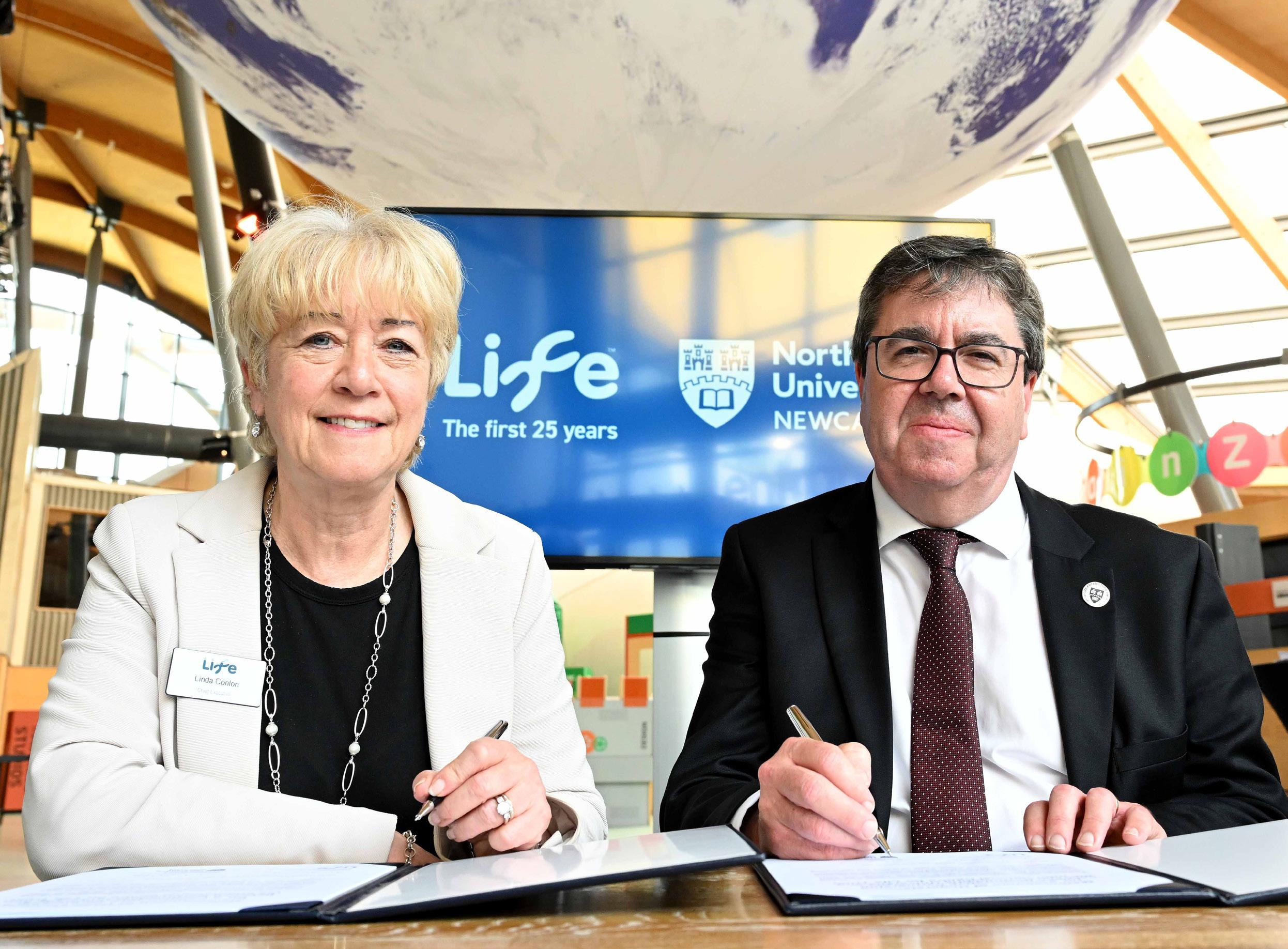
LINDA CONLON, CHIEF EXECUTIVE OF THE INTERNATIONAL CENTRE FOR LIFE AND PROFESSOR ANDY LONG, VICE-CHANCELLOR AND CHIEF EXECUTIVE OF NORTHUMBRIA UNIVERSITY
cutting-edge research accessible and interesting to a range of audiences.
Professor Andy Long, ViceChancellor and Chief Executive of Northumbria University, said: “This partnership with Life is a perfect alignment of missions. We are both deeply committed to inspiring communities and tackling global challenges through science. By building on our work together, we can continue to ensure that our research doesn’t just stay in the lab, but reaches classrooms, communities, and curious minds of all ages.”
The partnership includes a PhD studentship by Amelia Doran, who is based at Life studying playful digital experiences and how to support children to learn from their mistakes, fostering
creativity, and reducing fear of failure. The agreement also serves as a basis for a continuing programme of activity to enhance STEM education through school programmes, workshops, and other initiatives designed to spark curiosity and confidence in science, with a particular focus on under-served communities. This builds on Life’s longstanding relationship with NUSTEM, Northumbria’s outreach group which works with schools across the North East to provide activities and opportunities for children to engage with the STEM subjects.
Linda Conlon, Chief Executive of the International Centre for Life, added: “This new agreement reflects a rich history of collaboration between Life and Northumbria University
“BY BUILDING ON OUR WORK TOGETHER, WE CAN CONTINUE TO ENSURE THAT OUR RESEARCH DOESN’T JUST STAY IN THE LAB, BUT REACHES CLASSROOMS, COMMUNITIES, AND CURIOUS MINDS OF ALL AGES.”
PROFESSOR ANDY LONG
which has been grounded in our shared commitment to making science accessible and relevant to all. It comes at a significant moment as our 25th birthday marks a milestone in Life’s journey and with growing career opportunities across the sector, it has never been more important to equip young people with the skills and ambition to pursue a future in STEM.”
Another key aim of the collaboration is to offer opportunities for undergraduate and postgraduate students to develop skills and experience in STEM careers through placements and live projects, which are mutually beneficial to both organisations and
to the student experience. Northumbria aims to embed experiential learning into all its programmes — connecting the theory and knowledge learned in the classroom to real-world situations.
“We look forward to working even more closely with Life to further develop skills, to share new knowledge, to unlock potential and to create opportunity in the region and beyond,” added Professor Long.
Click the QR code to discover more about regional partnerships at Northumbria.

Rocks reveal evidence of how Earth came to life

Ancient rocks have revealed surprising insights into conditions on Earth more than two-and-a-half billion years ago, before oxygen was part of the atmosphere.
The fossilised rocks, known as stromatolites, were found in southern Zimbabwe and contain unusual patterns which were formed by nitrogen isotopes, representing some of the oldest evidence of life on Earth. The patterns provide clues about the biological and chemical conditions that existed on Earth long before the Great Oxidation Event – a critical turning point in Earth’s history when oxygen began to accumulate in the atmosphere, around 2.5 billion years ago.
Nitrogen is the most abundant gas in our atmosphere and is essential for all living organisms but must first be converted into forms that life can use, such as ammonium or nitrate. This process, known as the nitrogen
cycle, is a fundamental part of life on Earth. However, little was known about how this cycle functioned before oxygen levels began to develop.
Dr Ashley Martin from Northumbria’s Department of Geography and Environmental Sciences, worked with an international team of experts in geology, microbiology and geochemistry, who worked together to investigate the nitrogen patterns in the ancient stromatolites. Their analysis found stromatolites from shallower waters had higher nitrogen isotope values while those from deeper marine sediments had lower values. Their findings suggest that large quantities of ammonium, a form of nitrogen, accumulated
in deep ocean waters before coming up to the surface, providing a valuable nitrogen source for early microbial life. The researchers believe their findings, which are published in the scientific journal, Nature Communications, shed light on how volcanic activity had a role in creating a nutrientrich environment that may have supported early microbial growth, contributing to the development of life on Earth.
Dr Martin explained: “There are two key nutrients that control productivity in the oceans on geological timescales — nitrogen and phosphorus. Together they ultimately control the productivity of marine life.
“Our study reveals high nitrogen isotope values in
2.75 billion-year-old shallow water stromatolites, and lower nitrogen values in deeper marine sediments. This suggests that ammonium, which is nitrogen in its reduced form, accumulated in the deep waters and was brought into shallow waters by upwelling — the movement of deep nutrientrich water towards the surface of the ocean.
“A large ammonium reservoir would have been very beneficial for early life, providing the nitrogen source needed for biological processes to occur.
“These conditions, likely in an ocean depleted of dissolved oxygen with a strong volcanic or hydrothermal influence, would have helped to support microbial growth, potentially
spurring biological innovations and paving the way for the Great Oxidation Event.”
Dr Martin and one of the coauthors of the paper, Dr Monika Markowska, are members of Northumbria’s Environmental Monitoring and Reconstruction (EnMaR) research group. The team study modern and ancient environments, from the tropics to the polar regions, seeking to answer fundamental global questions about climate and the environment.
Click the QR code to discover more about Dr Ashley Martin’s work.

Egyptian visit of discovery for law students

Law students from Northumbria were part of an international study group participating in a new legal knowledge exchange programme hosted by the Office of the Attorney General of Egypt.
The inaugural Legal Knowledge Exchange Programme ran earlier this year and marks the beginning of an annual initiative between Egypt’s Public Prosecutor’s Office and international legal institutions. Bringing together 40 law students from Northumbria, the University of Vienna, and the German University in Cairo, the programme provided a unique learning opportunity to engage in intensive legal study, practical training, and cross-cultural collaboration.
Professor Mohamed Badar, Director of the Northumbria International Criminal Law and Practice LLM Programme, co-led the initiative alongside Counsellor Aly Mokhtar, Chief of Egypt’s Prosecution Offices and Digitalization. Speaking about the event, Professor Badar said: “This visit was not just an academic opportunity to observe Egypt’s legal system — it was a platform for fostering dialogue, collaboration, and mutual understanding between countries and cultures. By engaging with different legal systems, our students develop a globally aware mindset that is essential for solving complex international legal challenges.”

Throughout the weeklong exchange, students participated in lectures, workshops, and field visits to key legal institutions, including the Supreme Constitutional Court, the Ministry of Justice and the Ministry of Foreign Affairs.
Professor Badar added, “Our students’ participation in this programme reflects Northumbria’s commitment to providing real-world legal experiences that enhance professional and cultural competencies. These exchanges strengthen their ability to navigate international legal landscapes and drive forward future legal collaborations.”
Professor Michael Stockdale, Head of Department for Northumbria Law School, added: “This was an inspirational visit for our students. It introduced them to a variety of international law issues, helped them get to know other legal systems, and exposed them to a variety of new contacts, including some at very high levels.”
Click the QR code to find out more about Northumbria Law School.

“THE
SKILLS AND KNOWLEDGE I GAINED DURING MY TIME AT NORTHUMBRIA UNIVERSITY PLAYED A CRUCIAL ROLE IN TURNING MY PASSION FOR COFFEE INTO A SUCCESSFUL BRAND IN THE NORTH EAST”
JACK FENWICK, FOUNDER OF DAILY POUR AND NORTHUMBRIA UNIVERSITY GRADUATE
Shaking up the North East coffee scene
Business graduate and coffee and music enthusiast, Jack Fenwick, is making waves in the North East with his new venture Daily Pour. The Northumbria University entrepreneur has combined his two passions to create a coffee brand that brings people together with their love of music.
Jack graduated from Northumbria with a degree in Marketing Management in 2016. Using the knowledge he gained during his studies, he single-handedly designed Daily Pour from the ground up, including the website, social media presence and merchandise, designed to reflect the brand’s story and future vision. Each bag of Daily Pour coffee, roasted in the North East, features striking artwork by established North East graffiti artist Mul, famous for his recordbreaking Quayside mural and 2023 exhibition at The Baltic Centre for Contemporary Art. Mul’s work, known for its bold style and vibrant energy, encapsulates the brand’s rebellious, yet approachable spirit. Further enhancing the experience, a QR code on each bag links to a curated music playlist, aimed at blending the visual and auditory aspects of the brand.
Daily Pour is rapidly gaining traction, having recently announced a partnership with select retailers in Newcastle and surrounding areas. The coffee brand also recently hosted a DJ pop-up event in collaboration with Minor Figures Oat Milk at Hidden Heights Creative Studio in Newcastle. Daily Pour coffee was served up during DJ sets creating a fusion of music and coffee culture. “I wanted to create a coffee experience that was inclusive and enjoyable for everyone,” Jack said. “My love for coffee, design and music, combined with my marketing background, all came together to form Daily Pour. It’s about enjoying a great cup of coffee without the snobbery. We’re all about community, creativity and good times. The pop-up event was a perfect way to bring together coffee lovers, music enthusiasts and artists without the need to be out at a club until 3am. It’s exactly what Daily Pour is about — blending
great coffee with the energy of music, whilst building a space where people can connect and enjoy the moment.
“The skills and knowledge I gained during my time at Northumbria University played a crucial role in turning my passion for coffee into a successful brand in the North East. The marketing strategies, entrepreneurial insights and leadership training I received, laid the foundation for my success. Here’s to a future built on education, determination and amazing coffee.”
Daily Pour is currently building a community and plans for 2025 include more small-scale coffee events as the brand continues to deepen its roots in the music scene.
Click the QR code to find out more about studying Business at Northumbria.

Chief Executive Officer of Gatwick Airport and Northumbria alum, Stewart Wingate recently visited the University’s city campus for an exclusive talk with Engineering students, offering invaluable insights into the aviation industry.
Stewart graduated from Northumbria in 1994 with a degree in Electrical and Electronic Engineering. Returning to his alma mater, Stewart shared his extensive experience managing airports across Europe, including Budapest, London Stansted and now London Gatwick. And he explained the importance of an engineering mindset when tackling real-world challenges within a complex airport environment. Students from across multiple disciplines of engineering welcomed the opportunity to learn first-hand from a leader at the forefront of the aviation industry, providing them with knowledge that could help shape their own careers. Stuart spoke about key aspects of managing one of the UK’s busiest airports, including large-scale capital growth projects, sustainability initiatives surrounding runway challenges, baggage logistics, retail dynamics, and economic factors influencing the aviation industry. “It was fantastic to be back at Northumbria and have the opportunity to share advice with students who are right at the start of their career,” he said. “You must not be afraid to take chances. When opportunities come around, take advantage of them, even if you’re not 100% confident. In my experience, you can do anything when you’re surrounded by a brilliant team that supports you. The aviation sector boasts exciting opportunities, and it is wonderful to see the next generation of engineers eager to make an impact.”
During his visit, Stewart also met with academics from Northumbria University whose research focuses on energy sustainability and achieving
Flying visit from Gatwick’s CEO
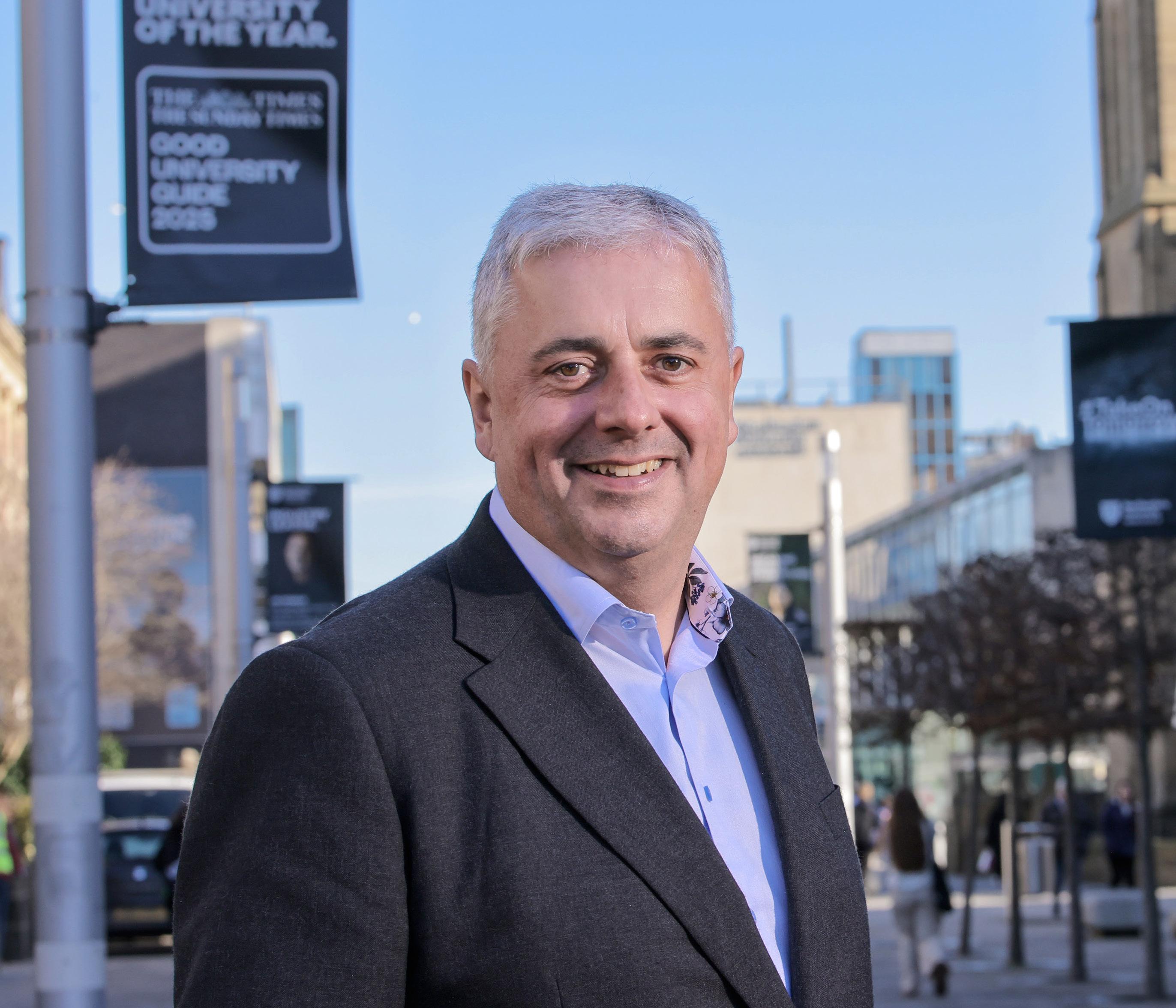
net zero — an area that aligns closely with Gatwick Airport’s ongoing efforts to reduce its environmental impact.
Dr Muhammad Wakil Shahzad from Northumbria’s Department of Mechanical and Construction Engineering, introduced him to a method of collecting air using a solar-powered device and creating water. Dr Shahzad explained
how his research is providing solutions for off-grid, remote, and disaster-stricken areas.
Reflecting on the visit

Professor Jane Entwistle, Interim Faculty Pro ViceChancellor for the Department of Engineering and Environment said: “It was a pleasure to welcome back Stewart Wingate to Northumbria’s city campus. His knowledge
“IT WAS FANTASTIC TO BE BACK AT NORTHUMBRIA AND HAVE THE OPPORTUNITY TO SHARE ADVICE WITH STUDENTS WHO ARE RIGHT AT THE START OF THEIR CAREER.”
CHIEF EXECUTIVE OFFICER OF GATWICK AIRPORT, STEWART WINGATE
and expertise as CEO of the second busiest airport in the UK are invaluable to students, as demonstrated during the thoroughly engaged Q&A session.”
Northumbria ranked 25th in the UK for research power in Engineering in the 2021 Research Excellence Framework and placed in the world top 250
for Engineering and Technology in the Times Higher Education’s World University Subject Rankings 2022. Click the QR code and search ‘Engineering’ to find out more about the courses on offer at Northumbria.

Self-care inspires winning fashion collection
A final year Fashion student from Northumbria University has been named the winner of a prestigious design competition, with a collection drawing inspiration from the Gen Z trend to seek out little moments of self-care.
The annual Next Graduate Fashion Foundation Design and Trend Competition challenges emerging designers to forecast trends and design a capsule collection for Autumn/ Winter 2025. Attracting entries from fashion students across the country, it was the work of Northumbria’s Kamile Kartunaviciute, that stood out to the judging panel. Inspired by a growing social trend among young consumers to ‘slow down’ amidst the hustle of everyday life, Kamile’s collection Thoughtful Indulgence was judged the winning submission.
Kamile’s entry won praise for its unique concept, sustainable approach, and nostalgic aesthetic. The 23-year-old, who is originally from Lithuania, carried out extensive trend forecasting research and conversations with her peers, during which she noticed a recurring desire for small moments of selfcare — for example, time to unwind with a sweet treat or a cup of
calm, cozy feeling of drifting through the fast-paced city life with ease and confidence.
As part of Kamile’s prize, she will have the opportunity to undertake a four-week placement with Next — the biggest fashion and lifestyle retailer in the UK — enabling her to develop her skills and explore the dynamic world of womenswear design. She also wins £500 and an opportunity to be selected for Next’s graduate trainee programme, with a guaranteed interview for the position.
Reflecting on the award she said: “I am beyond thrilled and excited about this opportunity, it’s a dream come true to see my work recognised on this scale, and I’m incredibly grateful to Next and Northumbria University for making this possible. I look forward to learning from this experience and continuing my journey in fashion design.”
The competition is run by the Graduate Fashion Foundation (GFF), a charitable organisation that supports young people in the fashion industry by bridging the gap between education and employment. GFF is also the organiser of Graduate Fashion Week, a major annual showcase of emerging fashion talent. This is the second year in a row a Northumbria University student has won this award, with Fashion Design and Marketing graduate Abbie Inwood named last year’s winner for her knitwear collection.
Knitwear designer has award win sewn up

A knitwear collection, designed by a Northumbria University student, and inspired by the industrial heritage of Teesside, has been chosen as the winner of this year’s prestigious Framework Knitters’ Livery Company Award.
When Beth Young joined Northumbria University as a Fashion student four years ago, she had never knitted before — but after being given the opportunity to learn in her first year, she proved to be a natural. Since then, she has developed her skills to such an extent that she has now been recognised by the knitting industry’s oldest and most respected organisation.

The Worshipful Company of Framework Knitters traces its origins back to 1589 and today it actively encourages and supports the next generation of knitting talent through bursaries and awards. As the winner of the Company’s 2025 award, Beth has received £1,500 which she will use to further develop her skills. The competition consists of two stages: applicants must first submit a proposal, then attend an interview with up to four Framework Knitters committee members. Beth presented her final-year concept which, inspired by Teesside’s
historic iron and steel industry, focuses on reclaiming craft and heritage. She also showcased her sketchbook and portfolio pages alongside knit samples she crafted from metal wire, metallic cord, monofilament, and silk — materials which are notoriously difficult to work with, reflecting the skills she has developed while studying at Northumbria.

Originally from Teesside, Beth has reflected on the significance of her work, saying: “The collection pays tribute to the region’s industrial resilience while incorporating a personal and feminine perspective through delicate lace artistry. Interestingly, I’d never knitted before university. I initially thought I’d focus on print design, but after learning knit techniques in my first year, I was hooked. The process of transforming yarn into fabric, exploring textures and colours, is endlessly rewarding.
“Winning the award is an incredible honour. The financial support will be invaluable in covering the cost of yarns and materials, allowing me to further develop my designs. I’m also excited about the opportunity to apply for Associate Membership with the Company.”
Sheila Turner, Chair of The Worshipful Company of Framework Knitters’ Education Committee, was part of the team to interview Beth. She said: “We were struck by Beth’s creative talent coupled with her excellent presentation of her work. Her technical knowledge of knitted structures, yarns and costings of manufacture were sound. Our award is to not only a financial advantage to Beth, but also, she can tap into the tremendous knowledge and experience of the members of our 368-year-old Company.”
Click the QR code to find out more about studying Fashion at Northumbria University.

Award for film inspired by loss

“IT MEANS SO MUCH TO BE RECOGNISED FOR SUCH AN AWARD, SPECIFICALLY FOR A FILM THAT WAS MADE AS A WAY FOR ME TO PROCESS THE MOST DIFFICULT POINT IN MY LIFE AND AS A DEDICATION TO MY MUM.”
WILL CROSTON
Northumbria University graduate Will Croston has been awarded a prestigious Royal Television Society (RTS) regional award for Best Student Drama for his film Husk, through which he uses his personal experience of grief to create a powerful cinematic experience.
Having graduated from Northumbria’s Film and TV Production degree program last summer, the 24-yearold’s journey into filmmaking wasn’t straightforward. Initially enrolling in an Electronic and Electrical Engineering course in 2019, he quickly realised his passion lay elsewhere and made the switch to Film Production in 2020. His academic path was further challenged in early 2023 when he lost his mother, Maria, after a seven-year battle with metastatic breast cancer. This tragic event led him to defer his dissertation but saw him return to his studies with a renewed vision for his final year project. The resulting film, Husk, is a deeply personal yet universally resonant exploration of grief,
following the character of ‘The Farmer’, whose descent into grief transforms his identity, reflecting the emotional turmoil that Will himself experienced.
Speaking about his recent recognition at the RTS North East and the Borders Awards, Will said: “It means so much to be recognised for such an award, specifically for a film that was made as a way for me to process the most difficult point in my life and as a dedication to my Mum.”
Robert Jefferson is programme lead for the Film and TV Production degree course at Northumbria University. Speaking about Will’s success he said: “I supervised Will’s film project which showed how
a high concept horror can be elevated with imagination and emotional connection. Will’s vision grounded the weird transformation in the physical world of the farm. Along with his talented team, he turned something that could have been ridiculous into something poetic and intense.”
The production of Husk was a collaborative effort between Will and fellow Northumbria graduates, co-producer Kornelija Gilaityte, cinematographer Greta Maksevičiūtė, co-editor Jack Sowden, as well as sound operator Gareth Hellens, cosound designer Josh Pace, and independent composer Oliver Stack.
Will’s time at Northumbria University has equipped him

with a strong foundation in film history, industry practices, and hands-on production experience. While studying he had the opportunity to work on several productions, including ITV dramas The Hunt for Raoul Moat and Vera, as well as Amazon Prime film How to Date Billy Walsh, and crime drama The Red King, which won best TV Drama at the RTS Awards. His biggest project was working on the third film in the Venom series, Venom: The Last Dance, for Sony.
He said: “I always wanted to be a director of films and visualise all the ideas I have scrambling around in my head. During my time at Northumbria,
I had the opportunity to work in different positions of a crew and discovered a newfound respect for each job and the complexity it involves. During the production of Husk, I was involved in each role alongside my amazing crew.”
Husk will be released to the public later this year after appearing at a number of film festivals.
Click the QR code to find out more about studying Film at Northumbria University.

Can AI speed up the development of life-saving drugs?
Major improvements could be made to the development and production of mRNA-based vaccines and medicines, thanks to new research into how AI and machine learning can speed up manufacturing processes.

Innovate UK has awarded more than £440,000 to a universityindustry project that aims to fast-track the development process for new mRNAbased genomic medicines and vaccines. Genomic medicines are used to treat conditions such as cancer or rare diseases.
Ribonucleic acid, known as RNA, is present in all living cells and has structural similarities to DNA. The human body uses RNA to construct cells or respond to immune challenges. A team of scientists will now use AI and machine learning to find new ways to encapsulate RNA in protective nanoparticles to deliver medicines to cells. The study involves researchers from the universities of Northumbria, Strathclyde and Teesside working with Redcar-based Micropore
Technologies, which specialises in formulating and manufacturing drug products.
Professor Wai Lok Woo, Chair in Machine Learning at Northumbria University, explained: “The development of genomic medicines is complex, with the encapsulation of nucleic acids within protective nanoparticles being perhaps the most critical stage in the manufacturing process. However, process equipment design, operating approach, formulation and active product all impact on how these intracellular drugs behave, and current iterative approaches to understand these behaviours is highly time consuming. This creates a barrier to the timely and successful development and manufacture of nano-delivered intracellular drugs.”
The project team’s intention is to use machine learning to identify and learn this complex series of relationships and build models which can accelerate formulation development. “This will make a step-change improvement to the speed and efficiency with which new genomic medicines can progress from discovery to real application in disease prevention and treatment,” added Professor Woo. Micropore Technologies has developed a product used in multiple phases of the drug development and production process. The universities will work with Micropore, using machine learning to speed up the development process from lab to commercial scale without the need to redevelop, redesign and re-optimise processes at different stages.
The study will initially use machine learning to analyse and interpret current and existing data before creating a model that can inform the design of experiments to reduce their development costs and increase their speed. Micropore Technologies have already developed a new micromixing and encapsulation technology which can be scaled up to commercial volumes. Dave Palmer, Technical Manager of Micropore Technologies, said: “We are looking forward to working with our partners to exploit machine learning to speed up the initial lab scale development and production pathway to improve the manufacturing process and ultimately bring new genomic
medicines into use much more quickly than had previously been possible.”
Northumbria University has a global reputation for research and teaching in AI and was recently awarded £9.5 million by UK Research and Innovation to establish a Centre for Doctoral Training in CitizenCentred Artificial Intelligence. Known as CCAI, the centre will focus on the inclusion of citizens in the design and evaluation of AI, helping to make the rapidly advancing technology work for everyone.
Click the QR code to find out more about CCAI.

Technology set to transform dementia support
PROFESSOR ARLENE ASTELL
Researchers are investigating new ways to use technology to support people living with dementia in rural and remote areas, after receiving a £1.6 million award.

Evidence shows that technology can help people with dementia stay physically, mentally, and socially active for longer. It can also track the progress of the disease and connect people with relevant services and resources. However, there is currently no coordinated system that brings together services and technology to support those living with the condition.
This is set to change as Professor Arlene Astell, a Professor of Cyber Psychology in Northumbria University’s Department of Psychology, aims to create local technology hubs in rural and remote areas across the North East and North Cumbria. The hubs will provide advice and recommendations on technologies that can support people living with dementia, as well as providing the facility to
loan devices to try at home.
Professor Astell will bring together health professionals, charities, local authorities, NHS Trusts and industry alongside, dementia patients and their families in this major project to develop technologies that aims to help dementia patients to live independently in their own homes for longer. The project is one of four from across the UK to be awarded funding from UKRI’s Engineering and Physical Sciences Research Council, the National Institute for Health and Care Research and the Alzheimer’s Society.
The new hubs will be set up in community venues giving people living with dementia and their caregivers the chance to explore, borrow and receive guidance on assistive technologies that meet their specific needs. The
hope is that this initiative will pave the way for a future where technology is seamlessly embedded into dementia care.
As lead of the Technology Empowered Dementia Independence (TEDI) Network Plus group, Professor Astell will identify gaps in the current system, pinpointing areas where technology and data sharing could enhance support.
She explained: “For many years, I have seen the potential of technology to improve the lives of people with dementia, but there has been a persistent gap in getting these innovations into homes and daily routines.
“Unlike medical devices that can be easily accessed through the NHS, many assistive technologies that could support independence — such as tools for managing finances, transportation, or
“FOR MANY YEARS, I HAVE SEEN THE POTENTIAL OF TECHNOLOGY TO IMPROVE THE LIVES OF PEOPLE WITH DEMENTIA, BUT THERE HAS BEEN A PERSISTENT GAP IN GETTING THESE INNOVATIONS INTO HOMES AND DAILY ROUTINES.”
PROFESSOR ARLENE ASTELL
home safety — lack a structured distribution pathway. TEDI Network Plus seeks to change this by connecting stakeholders and ensuring that practical solutions reach those who need them most.”
The North East and North Cumbria region has the highest proportion of people living with dementia in England, and given the region’s significant socioeconomic challenges, rural accessibility issues and digital
inequalities, it is seen as an ideal location to develop and test this new approach. Although the project will initially focus on the North East and North Cumbria, it has potential to be scaled and replicated nationwide.
Click the QR code to read more about the TEDI Network Plus project.

Strengthening global collaboration on volunteering research
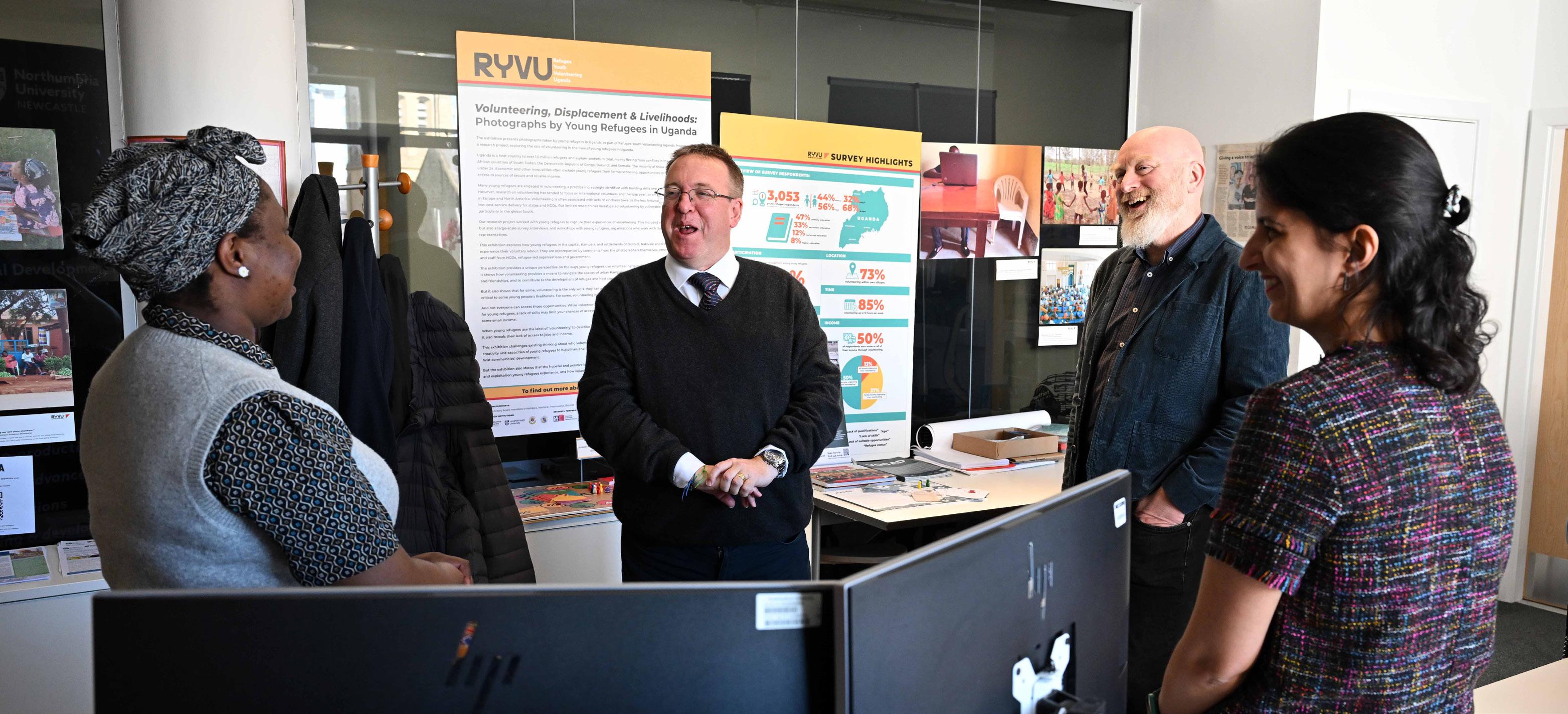
“IF WE DO NOT FIND METHODS OF MEASURING VOLUNTEERING IN WAYS THAT REFLECT THIS DIVERSITY, WE CAN UNDERVALUE IMPORTANT WORK THAT IS MAKING A CONTRIBUTION TO MEETING GLOBAL DEVELOPMENT CHALLENGES.”
PROFESSOR MATT BAILLIE SMITH
North East England connected with North East India when British Deputy High Commissioner, Dr Andrew Fleming, visited Northumbria University’s Newcastle City Campus and spoke with academics about their research on volunteering across the globe.
Dr Fleming, who is usually based in Kolkata for his role, made his first visit to Northumbria during a trip to the UK in April when he was introduced to some of the University’s key areas of research expertise by Dean of Research Culture, Professor Matt Baillie Smith.
The visit provided Dr Fleming with the opportunity to meet researchers from Northumbria Centre for Global Development and hear about their work with United Nations Volunteers (UNV) on volunteer measurement and gathering the latest evidence from across the world on the contributions of volunteers to peace, development and climate action. As the lead research partner involved in producing UNV’s next State of the World’s Volunteerism Report (SWVR 2026), this work from Northumbria academics will help shape the flagship United Nations
publication, which is designed to strengthen global understanding of volunteering.
Speaking about SWVR 2026, Professor Baillie Smith explained: “How we measure volunteering and its impacts is critically important for many stakeholders. But because volunteering means different things to different people and organisations globally, understanding ways to measure it can present significant challenges. If we do not find methods of measuring volunteering in ways that reflect this diversity, we can undervalue important work that is making a contribution to meeting global development challenges.”
Dr Fleming’s visit to Northumbria came after he, and the British Deputy High Commission in Kolkata, hosted a photography exhibition and the launch of a bilingual photobook showcasing the
findings of a piece of research led by Northumbria and Jadavpur University in India.
The exhibition and photobook featured findings from the Volunteering, Climate Adaptation and Disasters (VOCAD) project. The VOCAD project demonstrated the crucial role of voluntary work in meeting the challenges of climate change, while providing insights into community responses in the Indian Sundarbans — a cluster of low-lying islands and active delta region found in the Bay of Bengal. The research was funded by the UK Research and Innovation Global Challenges Research Fund as part of a wider
Living Deltas Research Hub project on building resilient delta communities.
Speaking about the VOCAD project, Dr Fleming called it an important piece of research built on a strong UK/India collaboration. He added: “I hope the insights shared can be widely disseminated and contribute to ensuring we do all we can to protect fragile but vital

ecosystems such as the Indian Sundarbans.”
Volunteers play critical roles in responding to the multiple humanitarian crises facing the world, however, research shows there are often gaps in protection and support for those working
to help others. To address this, researchers from the Centre for Global Development have recently signed a new agreement with policy makers and practitioners from the International Federation of Red Cross and Red Crescent Societies (IFRC), building on more than a decade of partnership. The aim is to strengthen capacity in collaborative volunteering research and practice, as well as to support 191 National Red Cross and Red Crescent Societies and more than 16 million volunteers engaged by them.
Northumbria University academics are creating a world-leading hub of research expertise, knowledge exchange and learning on volunteering in humanitarian crises and development contexts. Their work is supported through significant funding from UK research councils, leading global humanitarian agencies and organisations in the UK and internationally.

Click the QR code to discover more.
Play marks 30th anniversary of American bombing
A play written by Northumbria University academic Steve Gilroy was performed during memorial events marking the 30th anniversary of the Oklahoma City Bombing — the deadliest act of domestic terrorism in US history.
On 19 April, people from across the American state of Oklahoma came together to mark the anniversary of bombing and remember the 168 people who tragically lost their lives 30 years ago. Among those marking the event was Northumbia University academic and playwright Steve Gilroy, whose verbatim play, In the Middle of the West, has become a key tool in teaching young people about the bombing. Originally written 10 years ago, the play was the first to use a verbatim documentary style to explore the impact of the bombing. Steve has now produced an abridged version which was performed during remembrance events, including at the Oklahoma State Capitol. In the Middle of the West was also performed at schools across the State with the play and accompanying educational materials being introduced into the official State school curriculum.
Steve is recognised internationally for his expertise in verbatim theatre — a form of documentary theatre which uses the words of real people to tell their stories, allowing real-life experiences to be presented authentically and without dramatic license. In the Middle of the West was written by Steve using interviews with
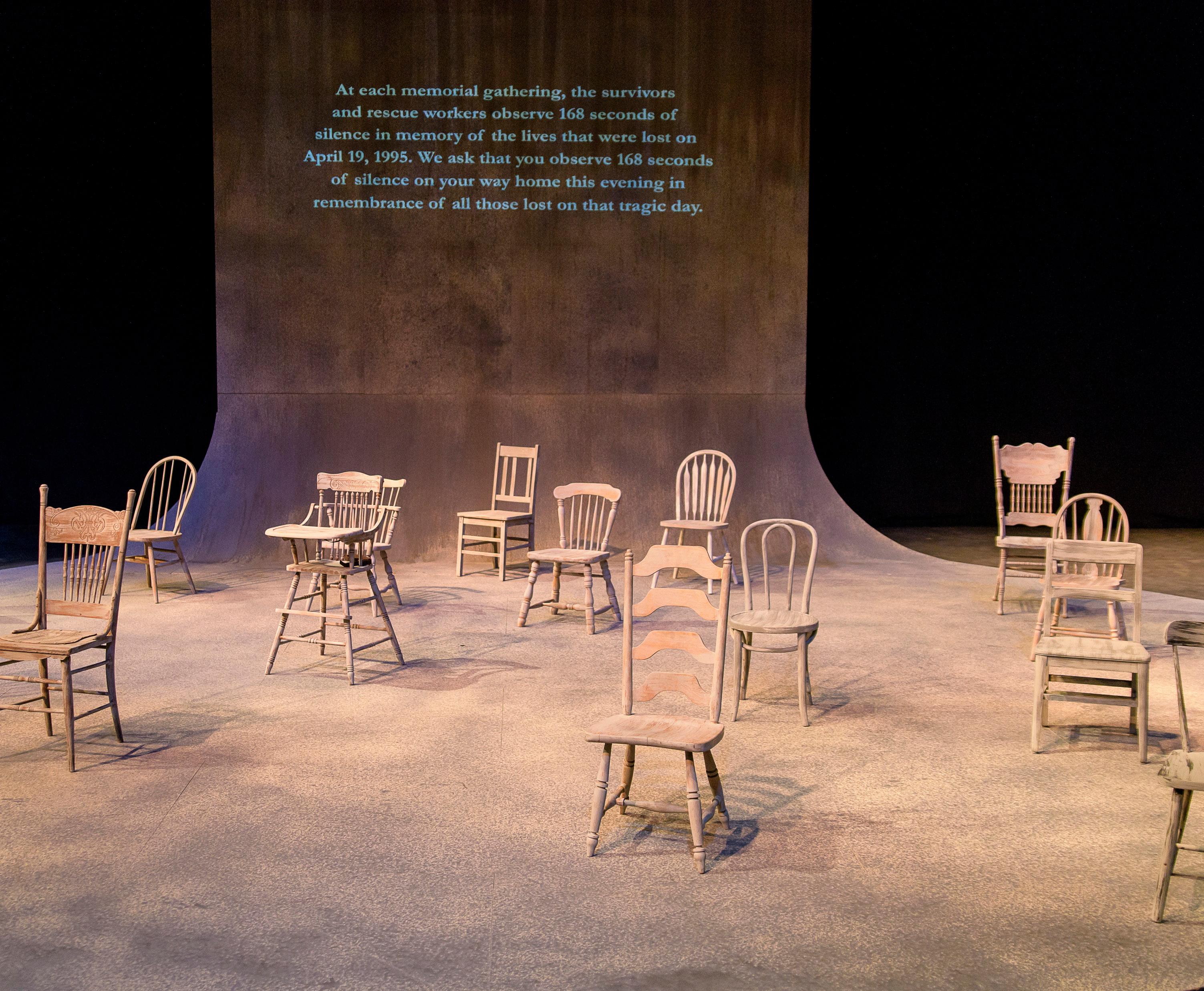
over 40 people involved in the aftermath of the bombing, which was carried out by US Army veterans Timothy McVeigh and Terry Nichols who targeted the Alfred P Murrah Federal Building in Oklahoma City. The performance includes testimonies from notable figures such as Jennifer Reynolds, the news anchor who reported on the bombing, and Chris Fields, the firefighter photographed holding a baby — an image which became an iconic symbol of the tragedy of the bombing.
Originally commissioned by Oklahoma City University, the
updated version of the play was shared with school pupils through live performances and streamed online. Educational workshops were also led by Steve, to help them understand the methodology behind his documentary theatre work. A key element of the project is an extensive evaluation process, set to run for at least two years, which will assess the impact of Steve’s unique approach on teaching practices, as well as students’ understanding of the bombing’s legacy. Discussing the importance of the project, Steve said: “When I first accepted the commission to create In the Middle of the West,

“BY USING VERBATIM THEATRE, I HAVE BEEN ABLE TO BRING TOGETHER DIVERSE VOICES FROM ACROSS OKLAHOMA — SURVIVORS, FIRST RESPONDERS, JOURNALISTS, AND COMMUNITY LEADERS — TO TELL A STORY THAT IS NOT JUST HISTORICAL BUT ALIVE WITH THE EMOTIONS AND COMPLEXITIES OF THOSE WHO LIVED THROUGH IT.”
STEVE GILROY
I was unsure about how to approach such a significant and painful event. However, by using verbatim theatre, I have been able to bring together diverse voices from across Oklahoma — survivors, first responders, journalists, and community leaders — to tell a story that is not just historical but alive with the emotions and complexities of those who lived through it.
I was incredibly honoured to be invited to Oklahoma for the 30th anniversary and to work with students who are helping tell this story in their own voices.”
Click the QR code to find out more about studying Theatre and Performance at Northumbria University.

Examining the use of welfare reform to tackle health inequalities

DR DAVID LITTLEFAIR AND DR JOANNE ATKINSON, DEPUTY AND HEAD OF DEPARTMENT FOR SOCIAL WORK, EDUCATION AND COMMUNITY WELLBEING AT NORTHUMBRIA UNIVERSITY ARE JOINED BY PUBLIC POLICY RESEARCHERS, PROFESSOR MATTHEW JOHNSON, DR HOWARD REED, DR ELLIOTT JOHNSON AND DR GRAHAM STARK.
As debate over changes to Britain’s welfare system continues to dominate the news, members of a multidisciplinary team of researchers are beginning a two-year study to examine the case for transformative welfare policy and the impact on public health outcomes.
Led by public policy researchers at Northumbria University and funded by the National Institute for Health and Care Research (NIHR), the study brings together experts in economics, behavioural science, health history and epidemiology. The team will carry out analysis of a growing body of research which suggests establishing a universal support system to provide people with more financial certainty could have a positive effect on mental and physical health, while saving the NHS money.
One option for reform is the introduction of a Basic Income, which is a regular cash payment from government to all citizens, regardless of whether they are in employment or how much they earn. However, while policies like Basic Income have been the subject of several localised pilots, they have yet to be trialled nationally in Britain. As a result, policymakers require new types of evidence on impact to determine whether the costs and benefits to public health add up.
Leading academics from the universities of Northumbria,
York, Warwick, Strathclyde, Birmingham and University College London (UCL), are now working to establish the latest evidence for government and policymakers in the study titled, Examining credibility of current evidence for welfare as a public health measure: pathways, causation and cost benefit of further research.
Matthew Johnson, Professor of Public Policy at Northumbria University and research group Chair of the Common Sense Policy Group, said: “This bold award provides an opportunity for an interdisciplinary panel of experts to interrogate thinking on this topic: Are estimates for potential impacts of Basic Income schemes correct? Might there be more or less impact than projections currently suggest?
How might our assumptions of impact change when we are forced to consider as potential biases the social, disciplinary and ideological framings of our thinking? The outcome of this project will be a much clearer assessment of whether and in what ways we might promote public health through a reformed
social security system.”
The study will use expert panels and surveys of public opinion on welfare policies, alongside economic modelling and analysis, to generate a new body of evidence on options for reform. Findings will then be incorporated into an interactive microsimulation model which allows individual policies to be assessed on economic and health impact, as well as popularity among the public.
Research that informs how policymakers might review existing welfare programmes or adopt and deploy basic income schemes is at the heart of activity from the team of researchers, led by Professor Johnson, at Northumbria University. Whilst being involved in evaluating a Basic Income pilot for young people leaving care in Wales, Northumbria

researchers have also supported a research report presented to Greater Manchester Mayor, Andy Burnham, which outlines a plan for a Basic Income pilot in the city. In 2023, they carried out extensive research and community consultation exercises, in partnership with communities in Jarrow, South Tyneside and East Finchley, London to develop communityled proposals for a twoyear Basic Income pilot on a smaller scale. As well as publishing reports on regional transport policy, democratic reform and the use of Radical Prevention Funds, the Northumbria team have also led the development of a blueprint for policy reform aimed at bringing an end to poverty and inequality in Britain. Act Now: A vision for a better future and a new social contract was published as a book before last year’s General Election. A second book, Basic
“THE OUTCOME OF THIS PROJECT WILL BE A MUCH CLEARER ASSESSMENT OF WHETHER AND IN WHAT WAYS WE MIGHT PROMOTE PUBLIC HEALTH THROUGH A REFORMED SOCIAL SECURITY SYSTEM.”
PROFESSOR MATTHEW JOHNSON
Income: The Policy That Changes Everything, was published in May. Northumbria University is dedicated to reducing health and social inequalities, contributing to the regional and national workforce and improving social, economic and health outcomes for the most marginalised in society. Through its new Centre for Health and Social Equity, known as CHASE, researchers will be delivering world-leading health and social equity research and creating innovative, evidencebased policies and data-driven solutions to bring impactful change across the region, the UK and globally.
Dr Joanne Atkinson, Head of Department for Social Work, Education and Community Wellbeing at Northumbria University, added: “This NIHR funding award is fundamental to expanding the Common Sense Policy Group’s work and contributing to the Centre for Health and Social Equity as Northumbria strives to create world-leading knowledge that drives social mobility and powers an inclusive economy. This is an example of how high-quality interdisciplinary research on the key issues of our age can inform discussions on national policy.”
Click the QR code to discover more about CHASE.

Doctoral students explore experiences of women after prison

Two students will have the opportunity to study fully funded PhDs through Northumbria University’s Centre for Health and Social Equity (CHASE), examining the experiences of women who have been in prison.
Justice system reformer and philanthropist, Lady Edwina Grosvenor is funding the PhD research projects. They will each consider women’s experiences before, during and following time in prison, with one focussing on women’s experiences of violence and the other on their ability to access housing. The funding follows the Government’s recent announcement of the formation of the Women’s Justice Board, an initiative that aims to better understand the experiences of women in the criminal justice system in order to enhance prevention of crime, reduce reoffending and better support and protect women and their children on a national scale.
society through world-class research. Designed to garner insight from people with lived experiences of the criminal justice system, the research will inform the development of future interventions that could help reduce the likelihood of reoffending.

The projects will form part of wider research being carried out through CHASE which focuses on reducing health and social inequities within our
Lady Edwina Grosvenor, a graduate of Northumbria University, has dedicated her career to influencing prison reform through systematic changes to the justice system for women. Speaking about the funding award she said: “It is a privilege to be able to continue to support the work of Northumbria University. The challenges women in the criminal justice system face are wide ranging and complex; this work will support long term solutions to reduce reoffending and most importantly will
support the women who face such issues.”
The two studentships will work together to explore two key areas. One project will look to engage with women involved in the criminal justice system and their experiences of violence before, during and
The second project will work with women who have experienced incarceration and will explore their relationship — and access to — housing and home, both before and after their time in prison.
Discussing the new funding for the CHASE studentships,
amount of work going on to support women with experience of incarceration, trauma, homelessness, stigma, substance use or dependence and adult exploitation, so these two projects fit right into what is already a vibrant ecosystem of research in this area.
after incarceration, including modern-day slavery, financial, criminal and sexual exploitation, home takeovers, radicalisation, mate crime and exposure to manipulation and emotional abuse.
Professor Monique Lhussier, Director of CHASE said: “We’re delighted to be able to offer these fully-funded projects and our immense thanks go to Lady Edwina Grosvenor and her team.
“Currently there is a huge
“Both these studentships are also available to those with lived experience of the issues being researched as part of our continued commitment to give as many opportunities as possible to the communities we work with. Widening participation in our research and building on the public involvement of our projects is fundamental to ensure that we develop interventions and policy recommendations that can have a real and lasting impact on some of the most marginalised groups in society.”
Click the QR code to learn more about the Women’s Justice Board.

Research to enhance gas turbine reliability through AI
Researchers at Northumbria University, in partnership with Siemens Energy, have been awarded a grant from Innovate UK for transformative research into the use of artificial intelligence (AI) to track obsolescence.
Cutting-edge AI and machine learning technologies will be used by Northumbria researchers to change the way that gas turbine components are monitored for the degradation and damage caused during operation that can lead to mechanical failures, also known as obsolescence.
The 28-month project is being undertaken in collaboration with global energy leader Siemens Energy and will leverage the expertise of Northumbria University’s researchers to design an advanced platform capable of predicting and tracking the degradation of gas turbine components. By integrating latest technologies in AI and machine learning, the platform will make a step-change in the way obsolescence challenges are managed in the energy industry.
Dr Hamed Farokhi, the project lead from Northumbria’s Department of Mechanical and Construction Engineering, emphasised the importance of this collaboration:
“Obsolescence management is a critical concern in industries reliant on longlifespan equipment, such as gas turbines. Our aim is to develop an AI-powered platform that will provide predictive insights and

actionable strategies, enabling more efficient resource allocation, cost reduction, and improved operational reliability. By collaborating with Siemens Energy, we have the opportunity to apply our research to real-world challenges, making a tangible impact on the energy sector.”
Gas turbines face significant challenges due to the wear and tear of critical components over time. Traditionally these issues are often addressed reactively, leading to costly downtime and inefficiencies.
The new platform will shift the paradigm to a proactive model, using AI-driven predictive analytics to anticipate damage to components before it becomes a problem.
Siemens Energy, with its extensive expertise in energy
technology and solutions, brings invaluable industry insights and technical knowhow to the partnership. Tobias Herzog, the Head of Small Gas Turbine (SGT) Service Centre of Competence at Siemens Energy UK, said: “This collaboration with Northumbria University marks a significant step towards integrating advanced AI solutions into our operations. The obsolescence management platform aligns with our commitment to our customers and driving innovation and sustainability in the energy sector.”
Fatemeh Mashak, SGT Obsolescence Project Lead, added that: “This partnership with academia and innovate UK is an exciting opportunity to enhance how we manage obsolescence at Siemens
Energy.
Integrating AI-driven tools into our operations enables us to manage obsolescence for our fleets more sustainably and contribute to a more efficient energy future.”
The Knowledge Transfer Partnership (KTP) initiative, supported by Innovate UK, showcases the important role of academia-industry collaborations in fostering technological advancements. This project not only addresses a pressing industry challenge, but also presents a unique opportunity to bridge academic research with practical applications. The project also
delivers broader benefits, including enhanced safety through better forecasting of component lifecycles, improved energy security with more reliable turbines, and reduced environmental impact by extending turbine lifespan and lowering emissions.
Click the QR code to find out more about Knowledge Transfer Partnerships at Northumbria.

Northumbria University is at the forefront of a pioneering research initiative aimed at transforming sustainability in the construction industry through the use of artificial intelligence (AI) and innovative waste management techniques.
Spearheaded by Dr Pablo Martinez Rodriguez from the Department of Architecture and Built Environment, the project has secured £250,000 in research funding from the European Commission’s prestigious Horizon MSCA. The funding will support efforts to improve waste recycling efficiency, reduce dependence on landfills, and promote circular economy principles both in the UK and internationally.
Construction waste poses a significant environmental challenge, with the construction, demolition, and excavation sectors generating 62% of the UK’s total waste, totalling a staggering 137.8 million tonnes annually. Across the European Union, construction and demolition waste is the largest single waste stream, accounting for 374 million tonnes. While the rate at which materials are recovered is relatively high, a large portion of this waste ends up in landfills or is repurposed in lower quality construction with shorter lifespans, highlighting the urgent need for more effective recycling and resource utilisation.
Dr Martinez, a leading researcher in sustainable construction, emphasised the project’s potential impact: “Sustainable construction is essential for addressing global environmental challenges. Our research harnesses AI to precisely track waste generation, optimise resource usage, and provide construction managers with real-time, datadriven insights to enhance waste management efficiency.”
Central to the initiative is the development of AI-powered decision-support systems which will enable construction
Groundbreaking AI research to tackle construction waste

managers to identify where waste is generated, implement targeted handling strategies, and assess project sustainability using newly developed key performance indicators (KPIs). These KPIs will evaluate efficiency in waste handling, resource utilisation, and the adoption of sustainable practices across projects.
In addition to technological innovation, the research will establish best practices, industry guidelines, and policy frameworks to support the widespread adoption of sustainable construction methods. A particular emphasis will be placed on encouraging the reuse of materials and designing
“THIS RESEARCH WILL NOT ONLY BENEFIT THE UK AND EU BUT ALSO SET A BENCHMARK FOR RESPONSIBLE CONSTRUCTION WORLDWIDE.”
buildings for easy disassembly and reassembly practices to align with the United Nations Sustainable Development Goal 12 for responsible consumption and production. Findings from the study will be disseminated to policymakers, industry stakeholders, and sustainability advocates to help drive systemic change in construction waste management. Dr Martinez added: “By promoting circular economy principles, we aim to catalyse a global shift toward

sustainable construction practices. This research will not only benefit the UK and EU but also set a benchmark for responsible construction worldwide.”
This initiative builds upon previous research led by Dr Martinez and Dr Osama Mohsen from King Fahd University of Petroleum and Minerals in Saudi Arabia. Their project, funded by the British Council’s UK Saudi Challenge Fund, explored how AI could reduce construction waste in both countries.
This work continues to strengthen Northumbria’s global reputation in AI research and education. The University was recently awarded £9 million by UK Research and Innovation to establish the Citizen-Centred AI (CCAI) Centre for Doctoral Training, which focuses on involving citizens in the design and implementation of AI systems to ensure the technology benefits everyone.
Click the QR code to find out more about how AI is used to research climate and sustainability.

Royal Statistical Society Honorary Fellowship for Northumbria academic

The Royal Statistical Society (RSS) has awarded a highly prestigious Honorary Fellowship to Northumbria University academic Professor Marion Oswald MBE.
Each year, the influential RSS awards honorary fellowships to a select group of outstanding individuals of great distinction working in fields related to statistics.
The lifetime award particularly recognises those whose work furthers the Society’s goals and values, such as supporting public understanding and furthering interdisciplinarity in research.
The RSS said Professor Marion Oswald’s work on administrative law for automated systems used by public authorities, driven by her leadership and pragmatism, has been instrumental in integrating ethical principles into data science practice.
Professor Sir John Aston, RSS President, said of this year’s cohort of awardees; “Our 2025 honours’ recipients exemplify the wide-ranging positive impact statistics can have on improving research outcomes and on society. This year’s honorary fellows are exemplary supporters of the discipline, showcasing what can be achieved through collaboration.”
A Professor of Law at Northumbria, Dr Oswald is also a Senior Visiting Fellow at the Centre for Emerging Technology and Security (the Alan Turing Institute) and chairs the West Midlands Police and Crime Commissioner and West Midlands Police Data Ethics Committee. Her research covers the interaction between law and digital technology, and has made distinctive contributions in respect of privacy, fair decision-making and artificial intelligence (AI), and the way that data is acted upon by the public sector, focusing on policing and national security. In 2022 Professor Oswald received an MBE for services to digital innovation. Professor Oswald is also a member of the Biometrics and Forensics Ethics Group (BFEG) which provides independent ethical advice to the Home Office on matters related to biometric and forensic material, and on complex data sets and AI. She is the Principal Investigator of the fouryear PROBabLE Futures project (Probabilistic AI Systems in Law Enforcement Futures), a keystone project funded by Responsible AI UK.
Click the QR code to find out more about PROBabLE Futures.

PROFESSOR GAVIN BUTT

“I AM
HONOURED TO HAVE MY WORK RECOGNISED BY THE ASSOCIATION FOR ART HISTORY AND TO JOIN OTHER
FELLOWS WHOSE WORK HAS BEEN PARADIGM-SHIFTING AND FORMATIVE IN MY OWN INTELLECTUAL DEVELOPMENT.”
PROFESSOR GAVIN BUTT
Northumbria academic awarded Art History Fellowship
Professor of Fine Art, Gavin Butt, has been announced as one of the 2025 Fellows of the Association for Art History, an honour awarded on the basis of his innovative research in the field, and its engagement with audiences beyond the academic art and art history worlds.
Currently researching histories of UK art education at Northumbria University, Professor Butt is a writer and creative researcher who explores the significance and impact of visual art in the contexts of popular music, queer culture and performance. He trained as an artist and art historian at Goldsmiths and the School of Fine Art, History of Art and Cultural Studies, and is also the author of Between You and Me: Queer Disclosures in the New York Art World (2005) and No Machos or Pop Stars: When the Leeds Art Experiment Went Punk (2022).
Alongside his academic work, Professor Butt works collaboratively on creative research projects examining the influence of visual art on culture including Mixed Up: Music and the Art School (2025), Performance Matters (2009-2013), This Is Not a
Dream (2011) and The Art School Dance Goes On (2023).
Speaking about the Fellowship, Professor Butt said: “I am honoured to have my work recognised by the Association for Art History and to join other Fellows whose work has been paradigmshifting and formative in my own intellectual development. The award is particularly meaningful to me because it recognises the contribution of my expressly multidisciplinary work and its address to readers and audiences across books, project and exhibition curation, LP record production and filmmaking.” 2025 is the sixth year for the Association of Art History Fellowship, with Fellows being recognised for their significant
contribution to the broad field of art history. Fellowships are awarded to academics, curators, educators, artists, and advocates of Art History who have advanced knowledge within the field or brought public support and attention to the subject more broadly.
Joining Professor Butt as Fellows for 2025 are Althea Greenan (Special Collections and Archives at Goldsmiths, University of London) and Craig Clunas (Professor Emeritus of the History of Art, University of Oxford).
Click the QR code to find out more about Professor Butt’s work.

Researchers recognised by Academy of Social Sciences



Three experts from Northumbria University were among 64 outstanding social scientists awarded prestigious Fellowships by the Academy of Social Sciences in April.
Dr Howard Reed, Professor Kathryn Haynes and Professor Helena Farrand Carrapico were all recognised by the Academy for excellence in research and applied professional use of social science.
After decades of pioneering work on the microsimulation of tax-benefit systems, Dr Reed, a Senior Research Fellow in Public Policy from the Department of Social Work, Education and Community Wellbeing, said he was grateful for the honour. Having previously held the positions of Chief Economist at the Institute of Public Policy Research (IPPR) and Programme Director, Work and Incomes Research, at the Institute for Fiscal Studies, he has made a significant contribution to the understanding of fiscal modelling and macroeconomics within research since joining the University in 2022.
As a Professor of Accounting at the University’s Newcastle Business School, Professor Haynes’ work demonstrates the powerful role of accounting within society,
particularly in relation to the interaction of equality and sustainability. She has recently completed a two-year Major Research Fellowship awarded by the Leverhulme Trust, and her book outlining the research outcomes, Accounting for Feminism — Exploring Emancipation for Profession and Practice, was published by Routledge.
Speaking of the recognition from the Academy, Professor Haynes said: “Although I am preparing to retire from full-time academic work, this award, together with the position of Professor Emerita awarded by the University, enables me to continue to engage with the powerful impact of social science in understanding equality and diversity in professions and organisations.”
Professor of International Relations and European Politics, Helena Farrand Carrapico, joined the Department of Social Sciences at Northumbria in 2019 and is recognised for her work on European internal security governance. Her research addresses how
Northumbria technician shortlisted for acclaimed prize

An inspirational Northumbria University technician has been shortlisted for a Papin Prize — the only national awards dedicated to celebrating the success and achievements of technical staff working in UK higher education institutions.
internal security concerns, such as cybercrime, organised crime, or migration, are constructed and responded to within the EU and the UK, as well as how policy responses impact society. Professor Carrapico co-authored a book on the impact of Brexit on the UK’s internal security, Brexit and Internal Security: Political and Legal Concerns on the Future UK-EU Relationship, and was selected to serve as a Commissioner with the Independent Commission on UK-EU Relations in 2022.
The three new Fellows from Northumbria are now part of a community of 1,600 leading social scientists from academia, the public, private and third sectors to have been awarded the Academy of Social Sciences Fellowship. Their practice and research addresses some of the major global challenges facing society today.
Click the QR code to read more.

Linda Lightley, a Scientific Officer in fashion at the Northumbria School of Design, Arts and Creative industries, was shortlisted in the Papin Excellence in Sustainability category, making her one of 68 technicians shortlisted across the UK from 328 nominations.
The Papin Prizes are among the most highly regarded awards for technicians in the higher education sector, recognising excellence in academia and the varied and valuable role they play in research and teaching. For the past decade they have continued to raise the visibility and recognition of technical professionals.
As a technician at Northumbria, Linda supports both research and teaching. With a strong background in fashion, she has more recently been instrumental in the delivery of a range of environmental-based projects, including the development of a new bio-design facility and materials lab which significantly enhances student learning and research projects in this field.
Dr Lizzy James, Director of Faculty Operations for Arts, Design and Social Sciences at Northumbria, said: “We were truly delighted to see Linda shortlisted for this prestigious
national award in recognition of her outstanding technical expertise and contributions to sustainable fashion and biodesign.”
Dr Kelly Vere MBE, Director for The UK Institute for Technical Skills & Strategy and Technician Commitment Programme Lead, added: “The Papin Prizes recognise and celebrate the very best technical staff across the UK. Because the submissions are invited from people who work with technical staff, they also increase recognition and visibility of technicians.”
The Papin Prizes are named after Denis Papin, a 17th century technician who worked with Robert Boyle, one of the founders of modern chemistry. Papin invented the steam digester and was one of the first technicians to publish in his own name.
The awards were presented at the UK Higher Education Technicians Summit (HETS), sponsored by UK Research and Innovation.
Click the QR code to find out who the winners of this year’s Papin Prizes were.

30 NEWS
Prestigious funding recognises emerging scientific leaders

“THROUGH THIS PROGRAMME WE ARE SUPPORTING THE NEXT GENERATION OF RESEARCHERS TO LEAD THEIR OWN GROUNDBREAKING RESEARCH SO THAT THE UK CAN CONTINUE TO BE A PIONEER IN MEDICAL SCIENCE.”
Two biomedical sciences researchers from Northumbria University have been awarded grants to further their innovative work by the Academy of Medical Sciences.
The Academy’s Springboard programme provides two-year support packages to researchers at the start of their research careers, including funding and access to the Academy’s acclaimed mentoring and career development programme.
Dr Emily Hume and Dr Monika Winter, both from Northumbria University, are among 62 researchers from across the UK chosen to receive funding in recognition of their pioneering approaches to improve human health and wellbeing.
Dr Hume has been awarded £100,000 to explore how digital technologies can improve physical activity and quality of life in patients waiting for lung transplants. With average waiting times of up to 18 months for transplant surgery, these critically ill patients often experience significant physical decline which can affect their survival chances and their posttransplant recovery.
Building on her previous work, Dr Hume will investigate whether a digital intervention
incorporating wearable technology, a personalised online platform and remote support from health professionals, could improve health outcomes for lung transplant candidates.
Northumbria colleagues
Professor Ioannis Vogiatzis and Professor Stephen Clark, who alongside his role at the University, is a consultant cardiothoracic and transplant surgeon at the Freeman Hospital, will collaborate with Dr Hume on the research.
“By empowering patients to stay active during long waiting times, this research aims to improve their quality of life, enhance post-transplant outcomes and address an important gap in transplant care,” explained Dr Hume.
Dr Monika Winter has been awarded £125,000 to further her research into genetic errors that shape the network connectivity of the energyproducing structures in cells, or mitochondria, in the human body. While DNA sequencing has identified many of these
errors in mitochondrial disease-causing genes, the underlying disease mechanisms remain elusive and can lead to neurodegenerative diseases, cancers and geneticallyinherited mitochondrial disorders.
Dr Winter’s project will focus on a group of patients carrying these genetic errors who developed serious neurological problems in early childhood, and where there are currently no cures available. By studying dysregulated mitochondrial connectivity, Dr Winter hopes to discover potential pathways to the development of new treatments. She will work to identify these new pathways with colleagues including Northumbria academics
Professor Simon Johnson and Dr Gerrit Hilgen, Professor R. Blake Hill from the University of Colorado, and Professor Robert Taylor from Newcastle University.
Dr Winter said: “This funding will support the development of better models to study rare

mitochondrial diseases that affect the cell’s energy system and can lead to serious issues like, seizures, developmental delays and muscle weakness.
“Our current knowledge of certain forms of mitochondrial disorders is limited, as most research relies on non-brain cells or animal models, that don’t fully reflect what happens in the human brain. By harnessing the incredible potential of stem cells, which can transform into almost any cell type in the body, this project aims to bridge this critical gap and lay the groundwork for future scientific progress and better patient care.”
The Academy’s Springboard funding is supported by the UK government’s Department for Science, Innovation and

Technology, The Wellcome Trust and the British Heart Foundation, who have invested more than £43 million in the next generation of research leaders since the scheme launched in 2015.
Lord Vallance, Minister of State for Science, said: “Through this programme we are supporting the next generation of researchers to lead their own groundbreaking research so that the UK can continue to be a pioneer in medical science.”
Click the QR code to discover more about research at Northumbria that is finding new ways to tackle disease.

New research challenges teaching in higher education
Academics from universities across the UK are about to launch a research project which could lead to changes in how higher education is taught – with a move away from traditional lectures in favour of a more interactive and playful approach to learning.

Employers are increasingly looking beyond academic knowledge from university graduates, now placing value on skills that make a candidate more well-rounded and able to adapt to workplace challenges, such as problem-solving abilities, resilience, creativity, and teamwork A project aiming to develop this is the £1 million RE:PLAY project (Researching the Effectiveness of Playful Learning in Higher Education). This has been granted almost £800,000 of funding from the Economic and Social Research Council (ESRC), with the remainder funded by collaborating institutions. It is the first large-scale, systematic study into the effectiveness of the playful learning approach – which encourages students to play an active role in their learning, through processes such as role play, interactive simulations, games, digital toys, quests and challenges. It will develop a deep understanding of the types of playful learning that are effective in different contexts, and why. The project aims to
change attitudes towards play in universities by encouraging leaders to be more confident in endorsing play, developing academics’ skills and confidence to use playful learning approaches, and supporting students to learn from play.
Professor Whitton said: “The pandemic has forced universities to rethink how they teach, yet resistance to change remains strong due to sector-wide challenges such as funding constraints and increasing workloads.
“Playful learning is not about making education frivolous; it’s about creating environments where students feel safe to experiment, fail, and learn from their mistakes. By demonstrating what works and why, we can challenge outdated teaching norms and better prepare graduates for the challenges of tomorrow.”
The RE:PLAY project will be conducted in four phases. The first explores how playful learning approaches are currently used and how they are perceived by senior leaders. The second
will investigate experiences, benefits, drawbacks, and barriers associated with playful learning. The third will develop a research-backed framework and toolkit for designing effective playful learning experiences. And the fourth will research the effects of playful learning on students, including their learning, motivation, fear of failure, sense of belonging, and creativity.
The ESRC-funded research will be carried out by a collaboration of academics at Northumbria University, Durham University, Anglia Ruskin University, University of Sussex, Coventry University, and University of the Arts London. In addition, six partner institutions — University of the Highlands and Islands, University of Edinburgh, University of Exeter, University of Greater Manchester, City St George’s University of London, and Teesside University — will support the research by carrying out surveys with their staff and students.
One aspect of playful learning which has already been embraced at Northumbria University is
PROFESSOR NIC WHITTON
“EXPERIENTIAL AND PLAYFUL LEARNING ARE AT THE HEART OF PRODUCING GRADUATES WHO CAN THRIVE IN UNCERTAINTY”
PROFESSOR GRAHAM WYNN
experiential learning — often described as ‘learning by doing’. This style of learning is already embedded into Northumbria’s curriculum and forms a key part of the University’s strategy to power an inclusive economy — resulting in more graduates from Northumbria gaining highly skilled jobs in the North East than any other university and is now offered to every undergraduate student no matter which course they study.
Professor Graham Wynn is Pro Vice-Chancellor for Education at Northumbria University. He said: “Experiential and playful learning are at the heart of producing graduates who can thrive in
uncertainty. This research into playful learning approaches is vital as we prepare graduates for complex future challenges where creativity and adaptability are as important as subject knowledge. We’re proud to support work that can open up new teaching approaches that don’t just convey knowledge, but build confidence, curiosity and resilience.”
Click the QR to find out how experiential learnings forms part of Northumbria’s 2030 Strategy.

The past academic year has been an exceptional one for Northumbria Sport, engaging with more students than ever before in their history, as well as securing extraordinary team and individual achievements whilst continuing their commitment to excellence across all areas of sport.
Among the standout successes, the Men’s Football 1st team secured an impressive double — clinching both the national British Universities and Colleges Sport (BUCS) League and Trophy titles. Not to be outdone, the Women’s Football 3rd team and the Women’s Rugby League 1st team also celebrated BUCS Cup victories, capping off brilliant seasons. In total, the University claimed 17 league titles and saw 14 of its teams promoted within the BUCS structure — a powerful reflection of the competitive strength and depth within the sports programme.
Northumbria also achieved further national recognition finishing as the number one institution in the UK for Men’s University Boxing. Individually, student-athletes delivered strong performances across several sports, bringing home a remarkable haul of 16 BUCS medals — including six gold, seven silver, and three bronze. Beyond the medals and league tables, 36 students were selected to represent either universitylevel or national squads across eight different sports.
Varsity continues to be a flagship event in the Newcastle student sporting calendar. The competition aims to highlight university sport in the city, with students from both Northumbria and Newcastle universities going head-to-head and competing for the Varsity Trophy. Reintroduced in 2022, Varsity has grown significantly over the past four years — from 36 teams across 16 sports to 72 teams across 29 sports. The current format is open and

Northumbria Sport continues to deliver on
and
off the pitch
inclusive, ensuring all students who wish to take part are given the opportunity.

For the 2024/25 season, ‘Feature Fixtures’ were introduced — selected matchups between teams that already compete in BUCS at the highest level — allowing these games to double as Varsity contests. This innovation helped to reduce pressure on athletes by utilising existing BUCS league fixtures while maintaining the intensity and spirit of Varsity. Six Feature Fixtures took place in Basketball (men), Rugby League (men), Rugby Union (men and women), and Volleyball (men and women), showcasing high-
level competition and building excitement ahead of Varsity Main Day, which took place on Wednesday 26 March. Over 1,800 students participated in Varsity overall, with the finale at Sport Central drawing a crowd of over 2,500 supporters, creating an electric atmosphere at our fan zone and capping off a spectacular celebration of student sport for the city.
Engaging with students across all sporting abilities remains central to Northumbria Sport’s ethos. Over 2,400 students were active members of its 82 BUCS teams, covering 35 sports, while 886 others took part in its Just Play programme which is inclusive, friendly and free to all Northumbria students, while a further 370 enjoyed Northumbria’s intramural student only leagues.
While competing is a big part of university sport, it’s the

hard work behind the scenes that truly brings it to life — and this year, students showed incredible commitment by volunteering their time to support and deliver a wide range of sporting activities. An impressive 398 volunteers and interns contributed a remarkable 19,133 hours of service to sportrelated roles, supporting sporting programme and gaining valuable learning experience.
Commenting on this year’s Northumbria Sport successes, Daryl Dixon, Head of Sport, said: “This year has been truly exceptional for Northumbria Sport where we have engaged more students than ever before in all our sporting programmes. Our teams and individual athletes have not only achieved incredible success on the national stage, but they’ve also embodied the values
of inclusivity and community spirit that define our programme. From league and cup victories to record-breaking participation in Varsity, we are proud of every student who contributed to this phenomenal year. These accomplishments are a testament to the hard work and dedication of our athletes, coaches, volunteers, and staff — and we’re excited to keep building on this momentum in the years ahead.”
Click the QR code to discover more about sport at Northumbria and learn more about this year’s successes.

